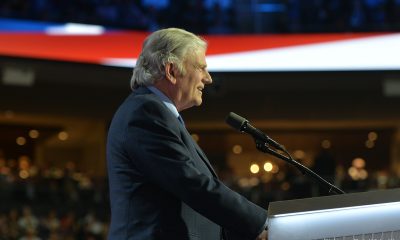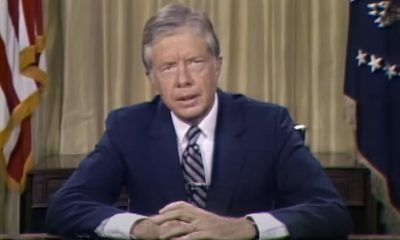History
David Mixner on how DADT happened
Clinton’s betrayal was an awakening
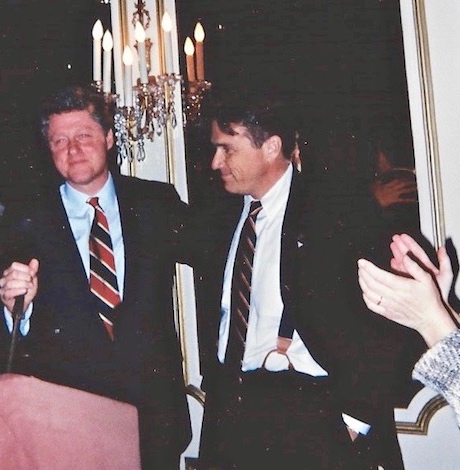
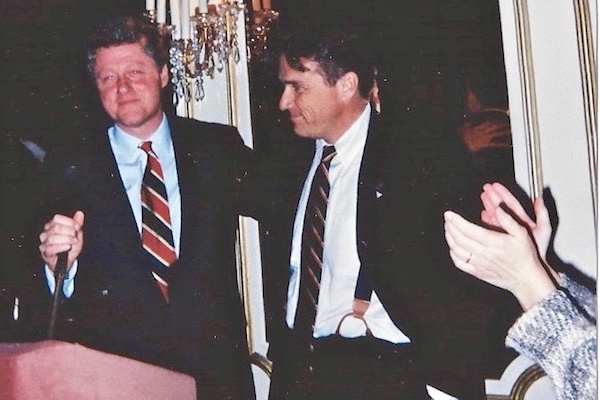
Presidential candidate Bill Clinton thanking friend David Mixner at ANGLE event in 1991 (Photo by Karen Ocamb)
David Mixner is a pacifist, a firm believer in the principles espoused by Gandhi and Martin Luther King Jr. He was prepared to go to prison for five years rather than respond to the draft—or come out as gay. He got a deferment after being beaten up by police during the 1968 Democratic Convention in Chicago. The following year, as co-organizer for the October 15, 1969 Moratorium to End the War in Vietnam, he met Bill Clinton, a Rhodes Scholar with whom he started a decades-long friendship.
AIDS, not gays in the military, was top of mind for Mixner, a longtime Los Angeles-based political consultant. But over dinners, he started hearing about gays serving in silence. “Clearly there was nothing more visible, more dramatic, more powerful than the image of LGBT Americans wanting to serve their country and going through everything from harassment to beatings to death to court martials to dishonorable discharge, losing benefits, losing families—it was an appalling situation,” Mixner told the Los Angeles Blade. “I can’t have my personal beliefs override the freedom of others.”
Then in 1991, Arkansas Gov. Bill Clinton called to say he was running for President and wanted Mixner’s support. Mixner hesitated, which annoyed Clinton. Mixner explained that he didn’t know where his old friend stood on gay issues. “I cannot go through this era of AIDS, losing hundreds of friends and just, for power’s sake, sign onto your campaign. It dishonors all of their deaths.”
Clinton told him to draw up a list of what he wanted and give it to their mutual friend, Los Angeles-based attorney Mickey Kantor. Mixner sent three issues: the gay Civil Rights Bill, sign an executive order lifting the ban on gays in the military and fund and expedite the process for promising HIV/AIDS drugs. Not a problem, Clinton replied.
The problem was that most of the LGBT community supported Paul Tsongas and didn’t know “this Bubba from the South,” Mixner says. He invited Tsongas and Clinton to meet with ANGLE, a political checkbook activist group that met in the Hollywood Hills home of Dr. Scott Hitt and Alex Kolezar.
Tsongas was arrogant; Clinton was charming. After pledging to support all three issues, attorney Diane Abbitt asked him: “How do we know we can believe you—that you’re not just another hot bag of air?” Clinton said he’d prove himself. Which he did, telling the surprised press that he would have signed AB 101, the gay rights bill Republican Gov. Pete Wilson vetoed. And he promised to sign the military executive order.
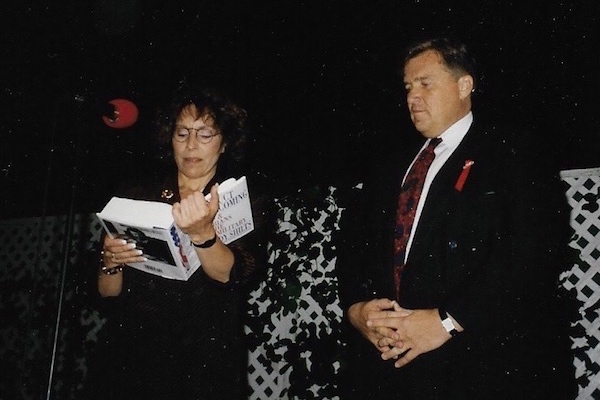
ANGLE’s Diane Abbitt reading a passage from “Conduct Unbecoming” at an ANGLE event at a Hollywood studio starring several out gay and lesbian service members in 1993 – Photo by Karen Ocamb
But the executive order wasn’t without controversy inside the Clinton campaign. But Mixner and ANGLE pushed hard, raising lots of money and insisting “gay rights” be part of Clinton’s talking points. And when the Paula Jones/Jennifer Flowers scandal popped up, ANGLE stuck with Clinton, even as others declared his candidacy dead. ANGLE bought one third of all the tickets to a major Warren Christopher-hosted fundraiser at the Beverly Wilshire, with a gay reception hosted by Mixner and Roberta Achtenberg before the big dinner.
“It was the darkest moment of the Clinton campaign and there we were visible, loyal and strong,” Mixner says. “That was a real turning point for us in the Clinton campaign. They never forgot it. And the money we raised really helped them stay alive in New Hampshire.”
Mixner pressed Clinton to appear before the gay community. Though it became one of his most famous campaign moment, it almost didn’t happen. Mixner had already sold out the Palace in Hollywood and if the press couldn’t attend, there would be some $200,000 left on the table. Clinton relented and recommitted to lifting the ban, giving money to fight AIDS and supporting gay rights.
Then came the nominating convention. Bob Hattoy and Elizabeth Glaser spoke about AIDS in primetime. But an early copy of Clinton’s acceptance speech was missing the word “gay.”
Tom Henderson and Mixner organized eight delegations that would walk out if no mention was made. Mixner gave an ultimatum and the campaign was livid. But Clinton included the reference, thrilling LGBTs and allies in the macarena-dancing crowd. When Clinton won, the LGBT community started counting down to freedom after the long dark night of Reagan/Bush years with thousands lost to AIDS.
But Mixner saw trouble brewing. A decision was expected soon in Keith Meinhold’s federal court case challenging his discharge under the gay ban. Two weeks before the election, Mixner and his close associate Jeremy Bernard trekked down to Little Rock, Arkansas to discuss how “the reality of rhetoric and implementation after you’re elected is two different things.” They needed someone in the transition team to assume gay issues in their portfolio.
“No one wanted it,” Mixner says. “They were all lining up for their jobs and they thought that if this was in their portfolio, that they would not be taken seriously. And quite honestly, I wasn’t taken seriously.”
After Clinton won, the community turned to Mixner, Bob Hattoy and Roberta Achtenberg for answers. Meanwhile, the Meinhold case is heating up. Mixner calls the campaign to say someone needs to brief the president-elect. “Yeah, yeah, yeah, yeah,” they say. “Well, the morning of Clinton’s first post-election press conference, guess what came down? The Meinhold decision. So the very first question that the New York Times asked: ‘Given the Meinhold decision, are you still going to issue the executive order on the military?’ Clinton, not having been briefed and not realizing that a campaign was different from governing, which I kept trying to tell him, wasn’t prepared and said yes.”
The campaign was shocked that the executive order on gays in the military dominated the headlines. “They all were caught off guard,” Mixner says. “They shouldn’t have been. They were all briefed two weeks before the election but no one listened. They went into sheer panic.”
But Mixner had an idea: “do what Jimmy Carter did on amnesty for draft dodgers, which was equally as controversial.” Immediately after he was sworn in as president, Mixner says, Carter “signed about twelve tough executive orders that got lost in the press about the inauguration, the parties, the parades, the speech—and it worked. It was just done. Amnesty was granted, some people fought it but it was a done deal and it got lost, it became a sidebar story of the inauguration.”
Why not do that on the military? About 20 orders, just like Carter “and then it’s done,” Mixner says. “They thought it was a great idea and they sent someone to look at what Carter did. That’s what we believed was going to be done up until just before the Inauguration.”
Mixner was in his hotel, nervous about a big event honoring him that night. He got a call from Clinton top campaign advisor George Stephanopoulos.
“He said, ‘David, we need your help.’ I said, ‘sure.’ He said, ‘We’re not going to sign the executive order.’ I said, ‘This is crazy.’ He said, ‘Listen, we feel we need six months to build public support. The president told me to tell you that he gives you his word that he’ll sign it in six months but we want the community to raise money and to do this and we need you to go and deliver that message to the community.’”
“I said, ‘Would the president promise me if we do all of that that he’ll sign it in six months?’”
“You have the president’s word,” Stephanopoulos told Mixner.
Mixner delivered the word that night and the next day to HRCF. “That’s where the idea for the Campaign for Military Service came in,” Mixner says. Tom Stoddard agreed to head the new organization. “There was not a better choice. Everyone was excited. A man of principle, of dignity, a brilliant organizer, one of the kindest people I knew. I was thrilled,” Mixner says.
And with that, they began organizing at Bob Shrum and Mary Louise Oates’ living room with David Geffen and Barry Diller promising to raise “huge amounts of money” and Fred Hochberg agreeing to be Treasurer.
“And off we were,” says Mixner. They organized a major campaign with unions and religious groups joining in and polls going up. “We did everything the president asked us to do.”
But instead of acting presidential, calling in the commanders-in-chief and announcing that they accept his change in policy or resign—Clinton failed the leadership test. And into the vacuum stepped Georgia Sen. Sam Nunn, a Democrat considered by Mixner to be a racist bully.
“Sam Nunn supported (Alabama Gov.) George Wallace twice,” Mixner says. “And he was head of the Senate Armed Services Committee. He was a big believer in segregation. And he said, ‘not on my watch’ and he called (Chair of the Joint Chiefs of Staff) Colin Powell and he held hearings and the White House wasn’t prepared.”
Nunn also created the media narrative, going with Sen. John Warner into the sleeping quarters on a submarine and asking sailors lying together in close quarters how they felt about allowing gays in the military.
“That picture was on the front page everywhere,” says Mixner. “So that sent them into a panic and Clinton came back and said, evidently, to his staff, we can’t have gays sleep with straights like that.’ And that’s when he suggested that perhaps they would explore the options of segregated barracks and segregated units. They didn’t use the word ‘segregated’ but separate. I went through the roof.”
Discharged gay Naval aviator Tracy Thorne was booked on ABC News’ Nightline and asked Mixner to go along. “That’s when I said, ‘Segregation didn’t work for blacks and we wouldn’t accept it and it was nothing more than a segregated plan.’ And I really let loose that this was a totally unacceptable solution,” Mixner says. “Well, that got the White House really angry at me.”
Mixner then went to Dallas where on March 27, 1993, he delivered a speech at the mega-MCC Church entitled “the Story of Self-Hatred” about AIDS, segregation, and gay and lesbian civil rights that is now in a collection of great civil rights speeches called “Ripples of Hope.”
The Clinton administration was angry and the gay community was annoyed that Mixner’s public pronouncements might cost access to political power after so many years in the wilderness.
“Rahm Emanuel decided that if he could make me a target, he could send a message that you’ll lose access and you’ll be punished if you speak out against this administration,” Mixner says. The “first act of that punishment” came in April before the March on Washington when Clinton held the historic meeting in the Oval Office between the President of the United States and the LGBT community “and I was taken off the list.”
Longtime LA-based lesbian activist Torie Osborn brought a signed copy of Randy Shilts’ very detailed “Conduct Unbecoming: Gays and Lesbians in the U.S. Military” to the meeting, which Clinton held when they posed for pictures.
“That was painful for me quite honestly, very painful. It hurt. Because that was one of my dreams of being in the first meeting,” Mixner says. “But you know, you live your principles and there’s a price sometimes. And sometimes there’s great price.”
Then in mid-May, without any notification to Tom Stoddard or Mixner or HRCF, out Rep. Barney Frank announces that a compromise had been reached with the president called Don’t Ask, Don’t Tell.
“We read about it in the fuckin’ newspaper,” Mixner says, his voice rising. “Barney literally betrayed us. He didn’t consult with any of us. They went to him and Barney was in love with Stephanopoulos and cut this deal.”
Suddenly, Mixner says, “the concept of an executive order was thrown out the window and the community, caught off guard, sort of started buying into this as a ‘compromise.’ Ending it would take an act of Congress instead of the signature of the president. But Clinton wanted that. He just wanted it off his fuckin’ desk.”
Tim McFeeley, executive director of HRCF, was the first to protest and get arrested.
After Clinton’s official announcement of the new policy on a military base flanked by generals, Mixner got a call in LA from Stephanopoulos. “He said, ‘We want your support on this, David. It’s fact. It’s done.’ And I said, ‘Absolutely not. This is going to be a disastrous policy. No one can live like that. It’s going to set up black mail. It will destroy thousands of lives’—and it did. There’s things I’ve been wrong on and there’s things I’ve been right on and this was one of ’em that I was right on.”
Numerous gay people on the inside offered Clinton support, suggesting Mixner was now among the fringe on the outside. He knew the price if he protested and got arrested like McFeeley.
“It isn’t like I was naive,” Mixner says. “I knew Clinton and I knew Emanuel. I knew all of them. I knew how the game was played. I went into it with open eyes that I would cut off all access to the White House. And I decided to get arrested.”
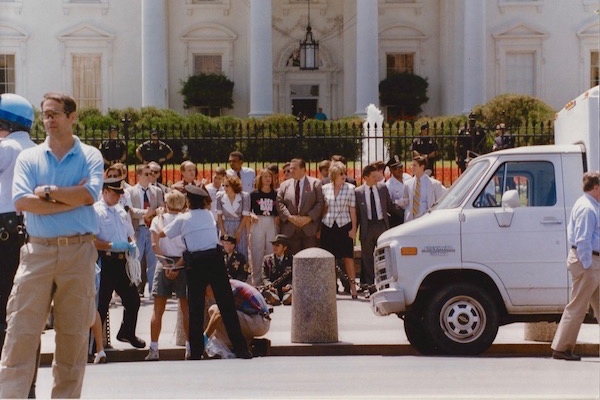
David Mixner, Diane Abbitt, John Duran among those arrested at the White House gate after DADT announced. Photo by Jeremy Bernard
But first, Mixner met with ANGLE, sharing his decision and that he didn’t expect them to join him. “This is a personal decision. I went around the country. I got him to say this stuff. I got you involved. I feel personal responsibility to give witness, though it’s not going to change the policy. It’s an old Quaker tradition of giving witness against a great evil, even though you can’t change it. I’ve gotta give witness,” Mixner says. “And much to their credit, most all of ANGLE joined in. And those who didn’t join in getting arrested were responsible for getting us out of jail.”
It was front page news and the next day Rahm Emanuel announced that Mixner was no longer welcome in the White House—nor were any of the people that he worked with.
“In twenty-four hours, I lost every one of my clients and couldn’t work for four years. I was selling watches to pay for my rent. Jeremy, literally, was taking my watches down to pawn shops to pay for my rent,” Mixner says.
The Advocate put him on the cover: “David Mixner, Friend of Nobody,” which added to the pain.
“There were people who committed suicide, several were sent to Leavenworth, over fourteen thousand were dismissed without benefits, dishonorably,” he recalls. “Just as we thought would happen. It was horrendous. And it all depended on who their commander was. If you had a good commander sometimes they ignored it. If you had a so-so commander they’d just give you a dishonorable discharge and let it go. If you had a bad commander, they’d go out of the way to make sure you paid a price.”
President Obama “had to spend his first four years overturning the damage that Clinton did to us,” he says. Mixner and Clinton eventually reconciled in 1998 at an ANGLE fundraiser in Beverly Hills featuring new California Gov. Gray Davis.
Mixner was “very teary” during the ceremony when Obama signed the repeal of DADT. “I never thought I’d see the day and had paid such a price,” he says. “The person who was the kindest to me that day was (Speaker) Nancy Pelosi. She was on the stage with the president, saw me and came down off the stage, gave me a hug, held me by the shoulders and said, ‘None of us would be in this room if it wasn’t for you.’ And I’ll never forget it. That was one of the highlights of my life and made all that I had sacrificed worth it.”
Mixner recalls going to the Clinton White House before he was banished with so many gay people whispering “Thank you.” He returned to the Obama White House for a Christmas party, invited by America’s first gay Social Secretary—Jeremy Bernard. “They had a little gay bowling league among some of the gay White House staff, the military people. And they were showing me pictures of their husbands,” Mixner says. “What a different world, right? From whispers to pride.”
Arts & Entertainment
A Night of legacy, love, and liberation: Inside the 2025 April Fool’s Ball
Ballroom culture continues to thrive among Black and Latin American queer culture

Late last month, the West Coast Ballroom Community lit up Los Angeles for one of the most anticipated events of the year — the April Fool’s Ball — produced by Legendary Father Markus Tisci. Now a staple of the L.A Ballroom calendar, the annual event is known not only for its high-caliber talent and unforgettable battles but for the legacy, love and chosen family it uplifts.
But let’s be clear: when we talk about “Ballroom,” we’re not talking about waltzing under chandeliers, we’re talking about the underground queer subculture birthed from the genius and resistance of Black and Latin American queer people — especially trans women and drag queens — in New York City.
Ballroom has since shaped and influenced mainstream culture, as seen in moments like Madonna’s “Vogue,” Beyoncé’s “Renaissance” and shows like “Pose” and “Legendary.” Today, that legacy continues to evolve and flourish far beyond New York, thriving in cities across the West Coast and beyond.
Markus Tisci has been a part of that movement for over 18 years and his roots trace back to the House of Rodeo — one of the West Coast’s most iconic original houses. In 2018, he founded the April Fool’s Ball with a simple but powerful goal: to bring laughter and creativity back into a space that was becoming, ‘a bit too serious.’ Conceived, produced and largely self-funded by Tisci, the ball is still known for its playful, pop culture — inspired categories that encourage imagination and joy.
Highlight the reel from the night of the House of Gorgeous Gucci.
This year’s April Fool’s Ball was filled with emotion, celebration, and remembrance. Just a few days earlier, the community laid Icon Devine to rest. The passing of the Queen of the West Coast Ballroom Scene and Legendary Mother of the West Coast Chapter of the House of Gorgeous Gucci left a deep void. For Ballroom Icon Jack Mizrahi, one of the night’s emcees and a foundational figure in Ballroom culture — as well as the father and founder of the House of Gorgeous Gucci — the event became a moment of both grief and healing.
“Seeing my house assembled, having each other to lean on, and the love we got from the whole West Coast Ballroom scene — it meant everything,” he shared.
In a powerful moment during the Legends, Statements and Stars (LSS) call — a time at the beginning of every ball when individuals are recognized and honored for their influence and impact — Mizrahi invited all trans women, whether they were walking or not — to step forward.
“Let the world know they deserve to be safe, protected, loved, and respected,” Mizrahi declared.
As the crowd cheered, those women (including the author) took their place with pride, their presence a radiant tribute to Icon Devine’s legacy and the enduring spirit of trans brilliance that Ballroom has always celebrated.
Fem Queen Parade at April Fools Ball 2025
The crowd erupted during the “Overall Face” final battle, where Jozea Flores — an up-and-coming Ballroom Legend in the House of Gorgeous Gucci — took home the grand prize of $1,000. In the “Face” category, contestants are judged on their natural beauty, expression, and how well they can ‘sell’ their face.
“When two stunning faces battle, you have to see who’s selling it more. That night, I sold it.” For Jozea, it’s about more than cash or trophies, though. “The energy from the crowd is my favorite part,” he shared. His message to the queer community: “Keep being true to yourself. Live boldly. Live loud.”
Royal Telfar Tisci, a fierce presence in “Gender Non-Conforming Runway,” also left their mark.
“It felt like old-school Ballroom energy,” they shared. “It was my first time walking at 5 a.m. — wild, but so worth it.” Royal walked with pride, earning their 10s and winning three battles.
“Runway is where we should shine. And that night, I did. But it raises the question — why aren’t GNC folks being included more consistently?”
As both a performer and advocate, Royal knows what’s at stake.
“There are forces trying to erase queer people, Ballroom, and especially the trans women who built it. We have to stay resilient, come together, and stay proud.”
Though Royal never lost to a competitor, the final battle and $3,000 grand prize was won by their chosen family member, Legendary Envy Tisci, the Bay Area Father of the House of Tisci.
“The night was long, but I enjoyed creating moments,” said Tisci. “I don’t get wrapped up in winning — I focus on the memories.”
Even as the night stretched into the early morning, the energy never faded. Destiny Ninja, Princess of the West Coast Chapter of the Iconic House of Ninja, delivered a voguing performance that closed the night with intention. She won “Women’s Performance” and after winning three battles, made it to the final battle in “Overall Performance.”
“I had so much to express and the runway was the perfect place to release it all,” she said.
The April Fool’s Ball continues to hold space for legacy and liberation. In the wake of Devine’s passing, the night became a reminder of the community’s strength.
“[Tisci] deals with applause, scrutiny and everything in between,” said Mizrahi. “And he still shows up. We need to stay united. Devine fought hard for visibility and respect. The West Coast needs to honor that — not with division, but with love.”
Tisci reflected on the night.
“Devine was a trailblazer—our Queen of the West Coast. Her impact still shapes the next generation. She’ll always be in our hearts. Tonight was about growth, legacy, and keeping the energy alive.”With the next major event — The Legacy Ball scheduled for June 1 — the community is already looking ahead. In a time of uncertainty and political hostility, the April Fool’s Ball re-affirmed what Ballroom has always been: not just a scene but a sanctuary. A home. A lifeline.
History
Los Angeles Blade celebrates 8 years!
SoCal’s LGBTQ+ news source celebrates 8 years of news catered to the LGBTQ+ community in print and online
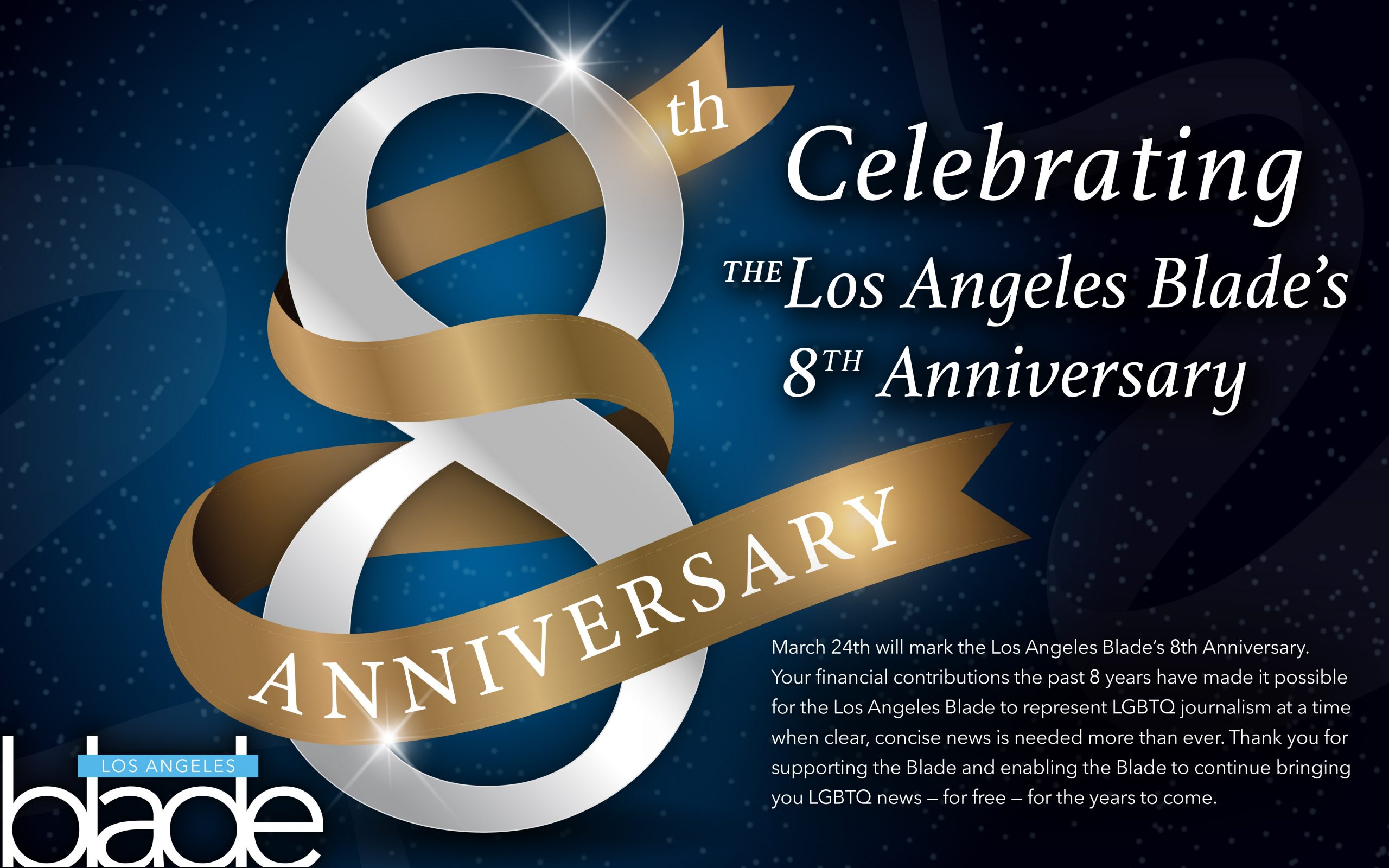
March 24th marks the 8th anniversary of our newspaper. Even as the political attack on the queer community wages on, we continue the legacy that Los Angeles Blade founder Troy Master began. Our promise to the LGBTQ community is to continue to bring you the latest in political, social, entertainment, nightlife, and activist news, for and by the community. Our voice will stay steady and strong and remain the leading news source for and by the queer community.
In addition to bringing you the latest in news, we will continue to highlight leaders from the community from the social and political world. Our initiative to build bridges with the Latinx community continues through our close relationship with CALÓ NEWS with weekly reporting on issues that affect both groups. This year we will be kicking off Pride season with the return of our Best in LA Awards show, coming back bigger and better than ever.
Among our new initiatives this year, we are returning to the community with a series of free panels and discussions, covering important issues that are affecting the community, queer and beyond. We will be working with our power partners from the non-profit world, government offices, and social organizations to remain active and visible in an effective way.
We are also growing our local writing team to better reflect the diversity that exists around us.
We continue to be Los Angeles’ only LGBTQ bi-weekly newspaper and the City’s largest, most frequently distributed media in print and online. Our sister newspaper, The Washington Blade, is the nation’s longest-running LGBTQ newspaper founded in 1969. It is also the only LGBT media member of the White House Press Corps.
As the new publisher of the Los Angeles Blade, I will work hard to honor the brand of The Blade and the work that Troy, our previous journalists and editors, and our community partners did to make us who we are today. A very heartfelt thank you to our readers and advertisers who continue to support our efforts.
Despite what is going on socially and politically towards the queer community, we will continue to thrive.
Alexander Rodriguez, Publisher
Please consider supporting the continuing efforts of the Los Angeles Blade with your financial contribution. For just dollars a month, your support makes vital LGBTQ journalism possible at a time when clear, concise news is needed more than ever.
For advertising opportunities, please contact Alexander Rodriguez at [email protected]
Today marks our 8th anniversary as SoCal’s LGBTQ+ news source and we want to thank you all for the support through the years. The Blade was founded in 2017 by Troy Masters, two years after he moved to Los Angeles in search of community and a fresh start for the next stage in his journalism journey.
He founded the Los Angeles Blade, because he saw the overwhelming need for accurate and unbiased news reporting for the LGBTQ+ community during a time where many other mainstream news outlets were overlooking the stories that affected our communities, such as the AIDS crisis.
In our everyday work since then, we aim to cover the issues that not only affect us, but that also inform us and spotlight our amazing talents, skills and ability to unite. We always aim to be a beacon of light, education and information for our communities because under this current administration, Trump has seemingly vowed to take us back into the dark ages and erase any and all progress we have painstakingly made throughout time.
My goal as editor is to include voices that make up our community and continue building trust with those voices, so that our work can serve you and everyone else under the LGBTQ+ and QTBIPOC umbrellas.
It’s true, Democracy dies in darkness and as members of the media, we must double-down in our efforts to provide accurate, informative and relevant news to our communities now more than ever.
The Blade has seen leadership shifts within the last six months, including myself, and we hope that these changes encourage you to support us and see how we continue growing.
Please reach out to us to discuss how we can better serve you or our communities. Don’t forget to subscribe to our weekly newsletter and donate to the Blade Foundation if possible.
Thank you all so much for your trust and support during these particularly difficult times.
Gisselle Palomera, Editor
Contact me at [email protected].
History
LGBTQ+ History Archive Gains Momentum: Personal Stories Project Partners with George Takei
Increased Awareness Through Social Media Reach

The LGBTQ+ History Archive Personal Stories Project is experiencing a surge in submissions. This decade-long effort documents LGBTQ+ history through personal narratives. Its success stems from a new partnership with actor George Takei and the .gay domain provider.
Charles Chan Massey co-founded and directs the Personal Stories Project. He credits the partnership’s success to Takei’s vast social media following. Takei, a vocal LGBTQ+ rights advocate, encouraged his 3.3 million X followers to share their stories.
Takei posted: “Each of us in the LGBTQIA+ community has a powerful coming-out story to tell. I want to hear yours. Head over to personalstories.gay today. Fill out the form to be featured on the Personal Stories website. I’ll be sharing some throughout the month to inspire others.”
Amplifying Community Voices
Logan Lynn is the creative director of .gay Domains. He emphasizes the partnership’s role in amplifying vital LGBTQ+ voices.
“Pride is about honoring and celebrating the depth of our communities,” Lynn said. “What better way to showcase this than through stories from people living LGBTQIA+ lives?”
Preserving Everyday Stories for Future Generations
Massey founded the LGBTQ+ archive project in 2012. His mission: preserve narratives of ordinary LGBTQ+ individuals, not just prominent figures.
“I wanted to archive our community’s history,” Massey explained. “Not just prominent members, but regular people who needed a platform. Regular people can identify with regular people. It’s important to see someone just like you.”
Massey maintains an online archive. This ensures accessibility of these oral histories for the LGBTQ+ community.
“As long as the internet exists, it can archive our stories,” Massey said. “We’re preserving stories for future generations. We’re also helping people find others with similar journeys.”
From Facebook Page to Registered Charity
The LGBTQ+ History Archive Personal Stories Project started as a simple Facebook page. It has evolved into a dedicated website and registered charity. It now supports LGBTQ+ organizations across the US and Canada.
Many participants share how LGBTQ+ organizations helped them. The Personal Stories Project encourages donations to these charities. Massey reports raising $15,000 to $25,000 annually for over 20 non-profits.
“95% of our budget goes to other 501(c)(3) organizations,” Massey said. “We support large and small community-based groups. A $200 donation can make a significant difference.”
A Diverse Collection of Experiences
The Personal Stories Project has a vast collection of LGBTQ+ stories. Massey is often struck by the depth of experiences shared.
“I met Peter, who was 85 at the time,” Massey shared. “He served in the Air Force, modeled in the 1940s, started an ad agency, and lived through the AIDS crisis. His story shows the power of these narratives.”
The project seeks submissions from all parts of the LGBTQ+ community. This includes people of various ethnicities and generations.
“People often think their story isn’t interesting,” Massey said. “But when they share, it’s captivating! Someone will identify with your story. Sharing is a powerful gift and a responsibility.”
Share Your Story
Do you have an LGBTQ+ story to share? Visit personalstories.gay to contribute to this important historical archive.
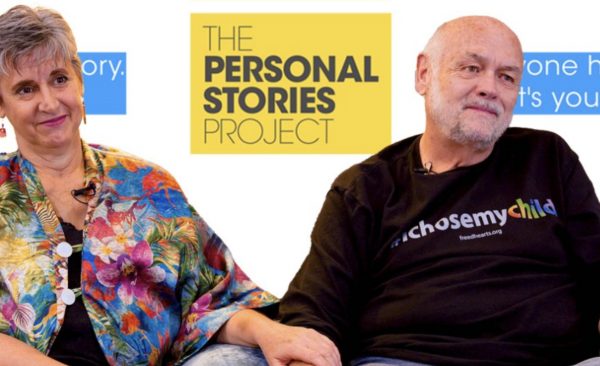
Image from Personalstories.gay website
History
The world-changing decision by psychiatrists that altered gay rights
December 15, 1973, was hailed by gay rights activist Frank Kameny as the day “we were cured en masse by the psychiatrists”
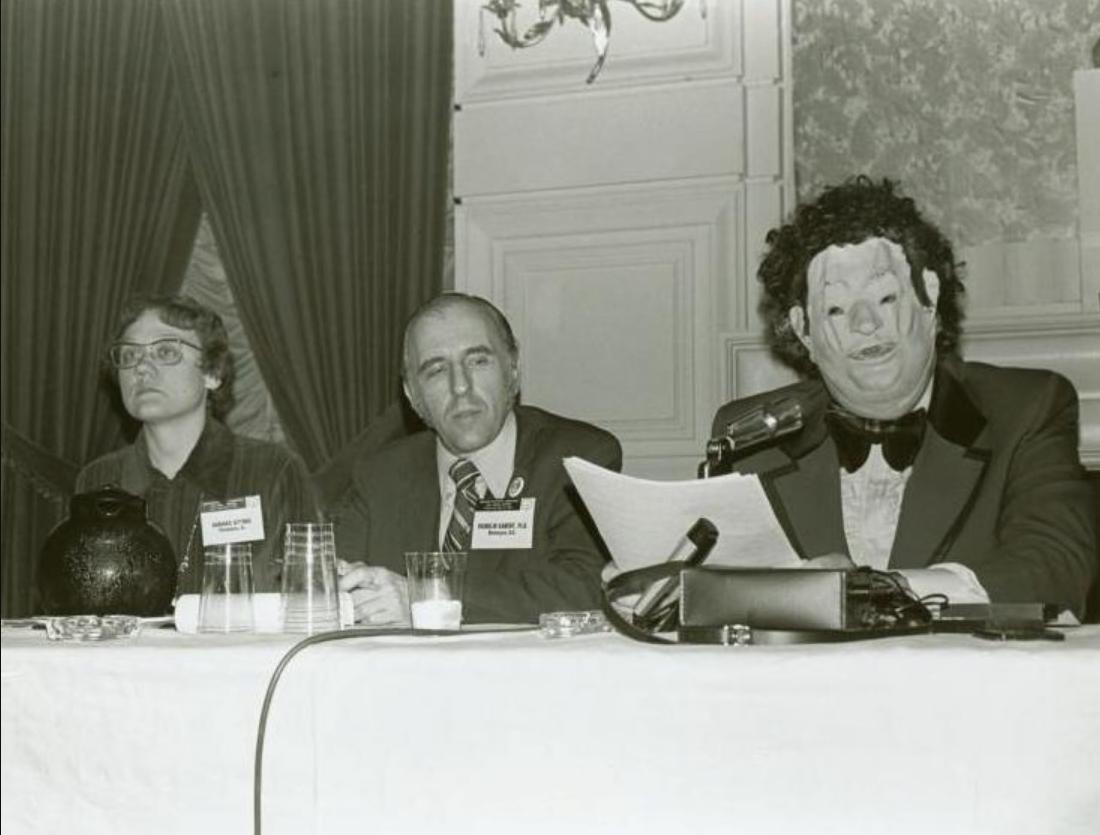
WASHINGTON – Fifty years ago this past Friday, on December 15, 1973, a decision by the American Psychiatric Association (APA) at its annual convention was hailed by gay rights activist Frank Kameny as the day “we were cured en masse by the psychiatrists.”
The board of trustees of the APA voted to remove homosexuality from its Diagnostic and Statistical Manual of Mental Disorders, which is used by health care professionals in the United States and much of the world as the authoritative guide to the diagnosis of mental disorders.
Washington Post writer Donald Beaulieu noted in an article published on the 50th anniversary that newspaper stories the next day mostly treated it as a technical change rather than a seismic shift that would transform the lives of gay people. But for gay rights activists Barbara Gittings, Kameny, Paul Kunstler, Jack Nichols, Elijah ‘Lige’ Clarke, Lilli Vincenz, and Kay Tobin Lahusen, it was groundbreaking.
Kameny and Nichols in 1961 had formed The Mattachine Society of Washington, D.C., that the others were actively engaged in with the purpose of conducting gay rights protests at the White House, the United States Civil Service Commission, and the Pentagon. By the late 1960’s the group also focused on efforts to declassify homosexuality as a mental illness.
Kameny and Gittings were determined to get the APA to act. Nichols, Clarke, Gittings and Lahusen would create some of the earliest gay themed content, stories and columns in early gay national publications.
Nichols with his partner Clarke, wrote the column “The Homosexual Citizen” for Screw magazine, a pornographic ‘straight’ tabloid publication in 1968. Lahusen’s photographs of lesbians appeared on the cover of The Ladder as Gittings worked as its editor. The Ladder, published by the Daughters of Bilitis (DOB), was the first national lesbian magazine.
In the August 1964 issue of The Ladder, Gittings’ editorial blasted a medical report that described homosexuality as a disease, writing that it treated lesbians like her more as “curious specimens” than as humans.
In 1971, some seven years later at the annual meeting of the APA, Gittings, Kameny and fellow gay activists stormed the meeting and Kameny seized the microphone, demanding to be heard. The Washington Post reported:
Kameny, who had lost his job as an astronomer with the Army Map Service in 1957 because he was gay, grabbed the microphone from a lecturer at the convention and addressed the room. “Psychiatry is the enemy incarnate,” he told the shocked audience. “Psychiatry has waged a relentless war of extermination against us. You may take this as a declaration of war against you.”
For the APA’s annual meeting in 1972, Kameny and Gittings organized a panel on homosexuality. When no gay psychiatrist would serve on it openly for fear of losing his medical license and patients, Gittings recruited Dr. H. Anonymous (John E. Fryer, M.D.), who appeared masked and using a voice modulator.
Gittings, Kameny and Dr. Anonymous asserted that the disease was not homosexuality, but toxic homophobia. Consequently, the APA formed a committee to determine whether there was scientific evidence to support their conclusion.
The Post noted: “This is the greatest loss: Our honest humanity,” Fryer said. “Pull up your courage by your bootstraps and discover ways in which you and homosexual psychiatrists can be closely involved in movements which attempt to change the attitudes of heterosexuals — and homosexuals — toward homosexuality.” Fryer received a standing ovation. He would not reveal his identity until 1994, 22 years later.
“In 1973, with Gittings and Kameny present by invitation, the APA announced its removal of the classification. Kameny described it as the day “we were cured en masse by the psychiatrists.” At the time, the “cures” for homosexuality included electric shock therapy, institutionalization and lobotomy. With the APA’s retraction, the gay rights movement was no longer encumbered by the label and its consequences.”
A symposium to address the issue occurred at the APA convention in Honolulu in May 1973 the Post reported. Panel members would represent both sides of the argument. There were those who fought the reclassification including one speaker who advocated retaining the homosexuality diagnosis, Charles Socarides, who received mostly boos from the crowd. Socarides asserted during the discussion, “All of my gay patients are sick.” According to Lawrence Hartmann, a psychiatry professor at Harvard University who served as APA president in the early 1990s, another panelist replied, “All of my straight patients are sick.”
According the Post, the last to speak was Ronald Gold, media director for the Gay Activists Alliance and the only panelist who was not a psychiatrist. Gold, who as a child was subjected to aversion therapy by a psychoanalyst, told the packed ballroom, “Your profession of psychiatry — dedicated to making sick people well — is the cornerstone of oppression that makes people sick.” Gold’s speech got a standing ovation, just as Fryer’s had the year before.
The legacy of that December decision fifty years ago continued when in 1998, the APA announced that it opposed any psychiatric treatment, such as “reparative” or conversion therapy, which is based upon the assumption that homosexuality per se is a mental disorder or that a patient should change his/her homosexual orientation.
In 2005, the APA established The John Fryer Award, which honors an individual who has contributed to improving the mental health of sexual minorities. The award is named for Dr. John Fryer, a gay psychiatrist who played a crucial role in prompting APA to review the scientific data and to remove homosexuality from its diagnostic list of mental disorders in 1973.
Out gay psychiatrist Amir Ahuja, who serves as president of the Association of LGBTQ Psychiatrists, told the Blade at an event celebrating the 50th anniversary of the historic speech by then closeted Fryer, that the positive outcome from Fryer’s efforts has had a direct impact on his own career.
“I would say I think John Fryer opened the door for me to have a career and many of my colleagues who are LGBTQ+ psychiatrists in order to work in a field where we’re not stigmatized as having an illness,” Ahuja said. “Because we could have lost our job. That’s what happened to John Fryer multiple times,” according to Ahuja. “Before he gave that speech, he had lost two residencies at least. Because of his sexuality, people were discouraging him from continuing in the profession.”
“John Fryer’s courageous actions were a watershed moment for psychiatry, the APA, and the LGBTQ community,” said Saul Levin, M.D., M.P.A., CEO & Medical Director of the American Psychiatric Association. “Every day we work to honor the legacy of Dr. Fryer and the activists who fought alongside him to achieve freedom, equality and acceptance for LGBTQ people in America.”
Additional reporting by Lou Chibbaro Jr.
History
Don’t ask – don’t tell, a Veterans’ Day reflection
On Sunday, Nov. 12 at 10 p.m. ET on MSNBC, and streaming on Peacock, ‘Serving in Secret: Love, Country, and Don’t Ask Don’t Tell’ will air
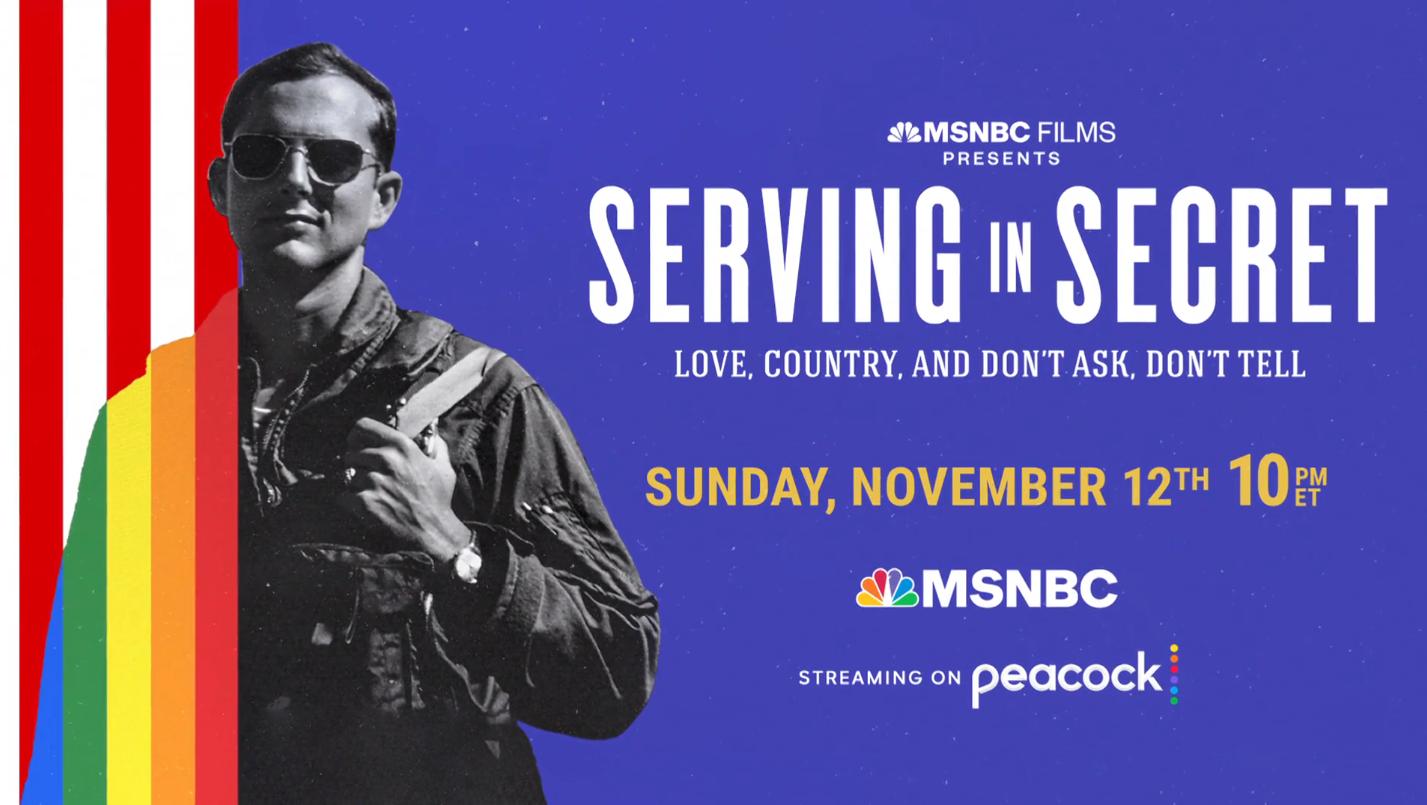
LOS ANGELES – On December 18, 2010, the U. S. Senate overturned the “Don’t Ask, Don’t Tell” policy by a 65-31 vote, which President Barack Obama signed a few days later.
As LGBTQ veterans mark Veterans’ Day 2023 today, the Los Angeles Blade takes a look back at a series of policies that marginalized and persecuted the LGBTQ community’s military service, and the activists who successfully pushed the government to repeal them.
Don’t Ask – Don’t Tell Repeal Act of 2010
During World War II, the U.S. Armed Forces established a policy that discharged homosexuals regardless of their behavior. In 1981, the Defense Department prohibited gay and lesbian military members from serving in its ranks with a policy that stated, “Homosexuality is incompatible with military service.” In the decade following, 17,000 service members were discharged from their duties for being homosexual.
This spurred a new policy called “Don’t Ask, Don’t Tell” during the Clinton Administration. In November 1993, the Defense Authorization Act put “Don’t Ask, Don’t Tell” into effect, allowing gay and lesbian citizens to serve in the military as long as they did not make their sexual orientation public. Commanders were prohibited from inquiring about a service member’s orientation provided that they adhered to this condition. Additionally, the policy forbid military personal from discriminating against or harassing closeted homosexual service members and applicants.
By 2008, more than 12,000 officers had been discharged from the military for publicizing their homosexuality. On December 18, 2010, the Senate overturned the “Don’t Ask, Don’t Tell” policy by a 65-31 vote, which President Barack Obama signed a few days later. The repeal allows gay and lesbian military members to serve openly in the armed forces.
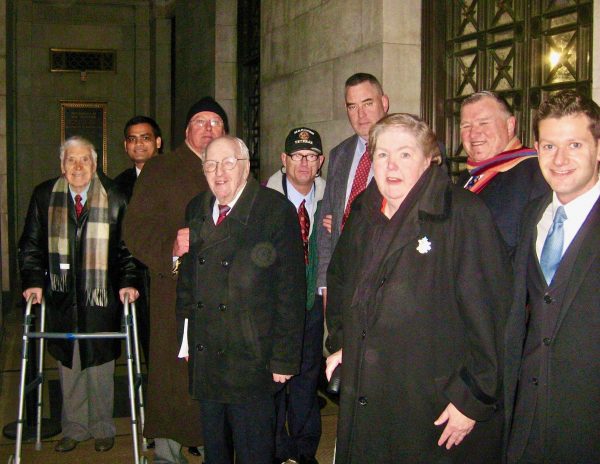
Left: (using walker) Dr. John Cook from Richmond VA and his assistant; SLDN Board Chair Tom Carpenter; Mattachine Society of Washington DC founder Frank Kameny; retired Marine Sgt. Tom Swann; unidentified tall guy: Pat Kutteles, mother of murdered infantry soldier Barry Winchell; politico David Mixner; and SLDN attorney Aaron Tax.
(Photo courtesy Tom Carpenter)
On the anniversary of the Don’t Ask, Don’t Tell Repeal in 2018, former SLDN Board Chair Tom Carpenter wrote a reflection for the Los Angeles Blade:
“Many in our community never understood why any LGBT citizen would ever want to become part of a military that proclaimed “Homosexuality is incompatible with military service,” often sending LGBT service members to prison because of who they loved. The hard-core anti-war/military crowd wanted no part in the fight to lift the ban on open service. Bowing to these objections, many large LGBT organizations paid nothing more than lip service to this effort.
As a candidate, Bill Clinton promised to lift the ban. Clinton had no idea the forces that opposed this change in policy. Those of us, who had served, knew better. The military and Senate leadership blocked him, including members of his own party. Instead of a policy, in 1993, we ended up with a federal law—“Don’t Ask, Don’t Tell.” (DADT). This law proved almost as bad for LGBT service members as the outright ban.
Shortly after the law went into effect, two young lawyers, former Army Captain Michelle Beneke and Dixon Osburn, established Servicemembers Legal Defense Network (SLDN). They realized other LGBT organizations had neither the desire, nor expertise, to take on the task of providing legal assistance to those who would likely run afoul of the law. Their ultimate goal was to repeal the law in its entirety, allowing for open and honest service.
I joined the board of SLDN in 1994 and served as its co-chair for 7 years. It was clear to us that it would be another 10-20 years before Congress would be willing to take up this hot-button issue again. During the administrations of George W. Bush from 2000-2008, we felt as if we were in the wilderness. Thousands of service members were being discharged as the military asked, and some LGBT service members told. SLDN provided legal assistance to many and saved numerous careers.
Our arguments of how unfair the law was, and how much it was costing taxpayers to train replacements for highly skilled service members who were discharged, gained little traction. Sadly, it was the brutal murders of a sailor, Allan Schindler, and a soldier, Barry Winchell that finally focused attention on why this law was counterproductive to military readiness, unit morale and discipline. Both these young men were brutally beaten to death because one of their fellow service members merely thought they were gay.
These two tragedies captured the attention of the country. At SLDN, we recognized it was personal stories that would humanize this fight for equality. The mother of Schindler, as well as the parents of Winchell actively participated in SLDN’s lobbying efforts on Capitol Hill. Their emotional appeal to members of Congress was powerful. But it was not enough.
Our strategy was to have veterans in the forefront of the lobbying and media effort. Especially effective were those who had been discharged, resigned their commissions, or did not reenlist because of their sexual orientation. The most compelling personal stories came from Arabic linguists, medics, pilots, and infantrymen who had been on the front lines in the Global War Against Terror. Many of these veterans appeared on television and had their stories reported by the press. Through these efforts, it was becoming ever more clear to the public, the law was not working. These veterans made the case by revealing the simple truth—the law was contrary to the core values of the services. It required them to live a lie.
It was not until Barack Obama was elected in 2008 that we started to see an end game. With a Democrat in the White House and a more friendly Congress, we continued our strategy of telling personal stories. By this time over 12,000 patriots had lost their careers. There was much foot dragging from the White House during the early part of President Obama’s first term. The memory of what had happened to President Clinton’s effort, sixteen years earlier, clearly impacted the willingness to spend political capitol on this issue.
By 2010, SLDN marshaled Congressional allies and helped draft a bill to repeal DADT. It was becoming clear SLDN”s media and lobbying efforts had changed public opinion. Most Americans now favored repeal of DADT. Further, the Pentagon was being threatened by a series of lawsuits that challenged the law. The turning point was when the Senate held hearings and Secretary of Defense Robert Gates testified he favored repeal. In contrast to 1993, the Joint Chiefs of Staff agreed.
In the lame duck session of the 111th Congress, notorious for inaction, a true miracle occurred. In a stroke of legislative brilliance, led by Army veteran, Congressman Patrick Murphy, DADT was repealed. On Dec. 22, 2010, President Obama signed the repeal law.
With the repeal of DADT, the first leg of institutional bias had collapsed. As predicted, in 2015, after a tremendous effort by LGBT groups, the Supreme Court ruled all Americans, regardless of sexual orientation, had a fundamental right to marry.
The only institution remaining in the way of equality is ministry. “Religious liberty” is now the rallying cry of the opponents of freedom for all Americans. While progress is being made, many battles still lie ahead. Never give up!”
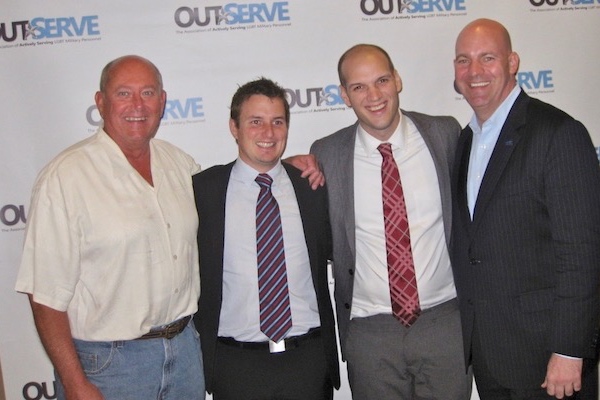
(Photo by Karen Ocamb)
On Sunday, Nov. 12 at 10 p.m. ET on MSNBC, and streaming on Peacock, ‘Serving in Secret: Love, Country, and Don’t Ask Don’t Tell’ will air:
In 1970, Tom Carpenter graduated from the Naval Academy ready to follow his family’s lineage in the military as a US Marine Corps attack pilot. Then he met Courtland Hirschi. Tom and Court fell deeply in love, keeping their illicit relationship a secret. At that time, homosexuality – if discovered – resulted in being kicked out of the military with a dishonorable discharge, a court martial, jail time, or worse… Tom and Court’s story would be no exception. ‘Serving in Secret’ features leading voices in politics, historians, civil rights activists, and retired military personnel telling the story of LGBTQ discrimination in the military, and the controversial compromise known as “Don’t Ask, Don’t Tell.” Tom’s work towards its repeal along with many others was the Turning Point for LGBTQ+ rights, a fight that continues today.
‘Serving in Secret: Love, Country, and Don’t Ask Don’t Tell’ (Link)
History
Hate: The bombing of the 16th Street Baptist Church remembered
Sixty years after four little girls were killed in the bombing at the 16th Street Baptist Church, at 10:22 a.m., the church rang its bells
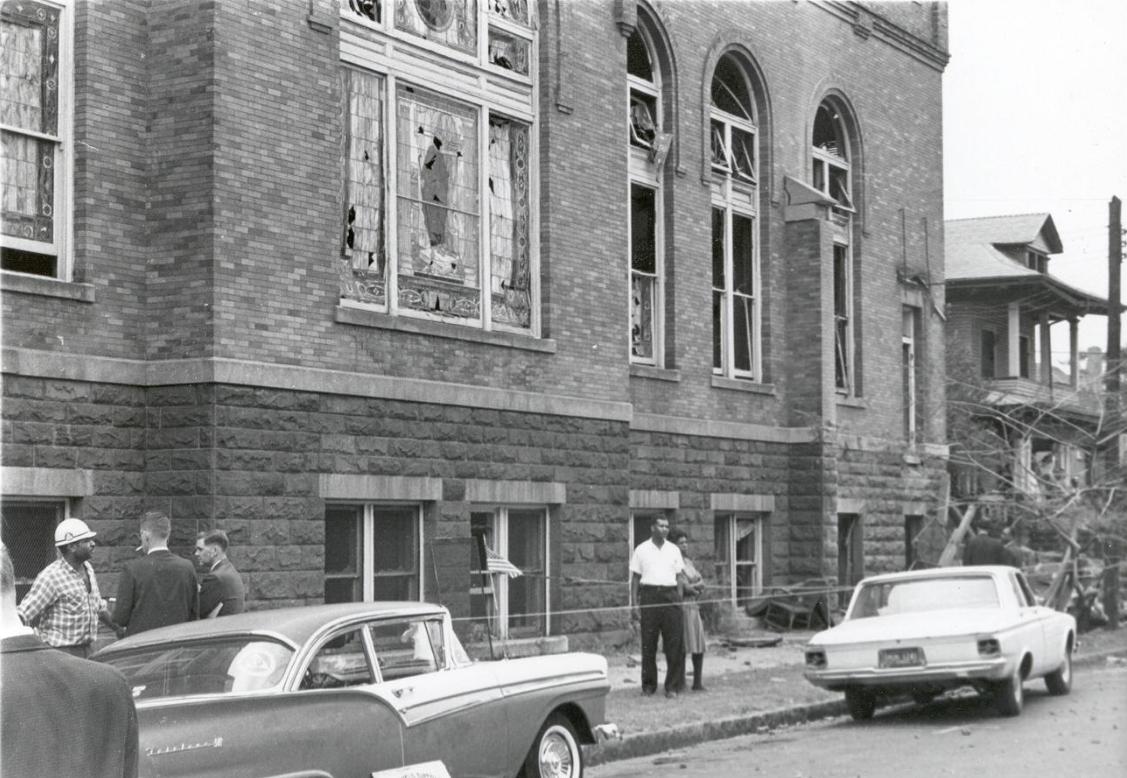
BIRMINGHAM, Ala. — It was a quiet Sunday morning in Birmingham—around 10:24 on September 15, 1963—when a bomb made from dynamite exploded in the back stairwell of the downtown Sixteenth Street Baptist Church. Minutes before a white man was seen placing a box under the steps of the church.
The blast killed Addie Mae Collins, 14; Carole Robertson, 14; Cynthia Wesley, 14; and Denise McNair, 11 injuring 20 more and left the sister of Addie Mae Collins, 12-year-old Sarah Collins Rudolph, suffering from not only the loss of her sister, but her eyesight as well.
The Federal Bureau of Investigation notes in the agency’s history of the event that the bombing was a clear act of racial hatred: the church was a key civil rights meeting place and had been a frequent target of bomb threats.
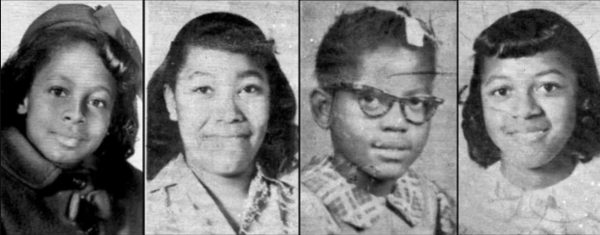
(Photo Credit: Photographic collections of the Library of Congress)
Addressing the American people on Monday, September 16, 1963, President John F. Kennedy said:
“I know I speak on behalf of all Americans in expressing a deep sense of outrage and grief over the killing of the children yesterday in Birmingham, Alabama. It is regrettable that public disparagement of law and order has encouraged violence which has fallen on the innocent. If these cruel and tragic events can only awaken that city and State–if they can only awaken this entire Nation–to a realization of the folly of racial injustice and hatred and violence, then it is not too late for all concerned to unite in steps toward peaceful progress before more lives are lost.
The Negro leaders of Birmingham who are counseling restraint instead of violence are bravely serving their ideals in their most difficult task–for the principles of peaceful self-control are least appealing when most needed.
Assistant Attorney General Burke Marshall has returned to Birmingham to be of assistance to community leaders and law enforcement officials–and bomb specialists of the Federal Bureau of Investigation are there to lend every assistance in the detection of those responsible for yesterday’s crime. This Nation is committed to a course of domestic justice and tranquility–and I call upon every citizen, white and Negro, North and South, to put passions and prejudices aside and to join in this effort.”
The FBI’s account of the aftermath and investigation
At 10:00 p.m. that night, Assistant Director Al Rosen assured Assistant Attorney General Katzenbach that “the Bureau considered this a most heinous offense…[and]…we had entered the investigation with no holds barred.”
And we backed that promise up. Dozens of FBI agents worked the case throughout September and October and into the new year—as many as 36 at one point. One internal memo noted that:
“…we have practically torn Birmingham apart and have interviewed thousands of persons. We have seriously disrupted Klan activities by our pressure and interviews so that these organizations have lost members and support. …We have made extensive use of the polygraph, surveillances, microphone surveillances and technical surveillances…”
By 1965, we had serious suspects—namely, Robert E. Chambliss, Bobby Frank Cherry, Herman Frank Cash, and Thomas E. Blanton, Jr., all KKK members—but witnesses were reluctant to talk and physical evidence was lacking. Also, at that time, information from our surveillances was not admissible in court. As a result, no federal charges were filed in the ‘60s.
It has been claimed that Director Hoover held back evidence from prosecutors in the ‘60s or even tried to block prosecution. But it’s simply not true. His concern was to prevent leaks, not to stifle justice. In one memo concerning a Justice Department prosecutor seeking information, he wrote, “Haven’t these reports already been furnished to the Dept.?” In 1966, Hoover overruled his staff and made transcripts of wiretaps available to Justice. And he couldn’t have blocked the prosecution and didn’t—he simply didn’t think the evidence was there to convict.
For its part, the FBI noted that in the end, justice was served.
Chambliss received life in prison in 1977 following a case led by Alabama Attorney General Robert Baxley. And eventually the fear, prejudice, and reticence that kept witnesses from coming forward began to subside. We re-opened our case in the mid-1990s, and Blanton and Cherry were indicted in May 2000. Both were convicted at trial and sentenced to life in prison. The fourth man, Herman Frank Cash, had died in 1994.
Marking the 16th Street Baptist Church bombing, 60 years later
Birmingham NBC News affiliate WVTM-TV 13 reported that the 16th Street Baptist Church rang its bells in honor of bombing victims 60 years later at 10:22 a.m. and read the victims’ names out loud in remembrance.
U.S. Supreme Court Associate Justice Ketanji Brown Jackson was the keynote speaker Friday during the commemoration service at 16th Street Baptist Church 60 years after the bombing that killed four girls.
In her remarks, Jackson, the first Black woman to serve on the U.S. Supreme Court, standing at the pulpit in the historic church told those gathered for the commemoration services,
“Today we remember the toll that was paid to secure the blessings of liberty for African Americans and we grieve those four children who were senselessly taken from this earth and their families robbed of their potential,” Jackson said.
”The work of our time is maintaining that hard-won freedom and to that we are going to need the truth, the whole truth about our past,” the Justice said noting that while the American nation should celebrate the advancements that have been made since 1963, there is still work to do.
Jackson said she knows that atrocities “like the one we are memorializing today are difficult to remember and relive” but said it is also “dangerous to forget them.”
“If we are going to continue to move forward as a nation, we cannot allow concerns about discomfort to displace knowledge, truth or history. It is certainly the case that parts of this country’s story can be hard to think about,” she said adding, “Yes, our past is filled with too much violence, too much hatred, too much prejudice, but can we really say that we are not confronting those same evils now? We have to own even the darkest parts of our past, understand them and vow never to repeat them.”
Related:
Birmingham church bombing survivor speaks out 60 years later:
History
‘Fagots Stay Out:’ Protest at Barney’s Beanery 53 years ago today
Rocco interviews Morris Kight, founder of the California chapter of the Gay Liberation Front and a young Rev. Troy Perry
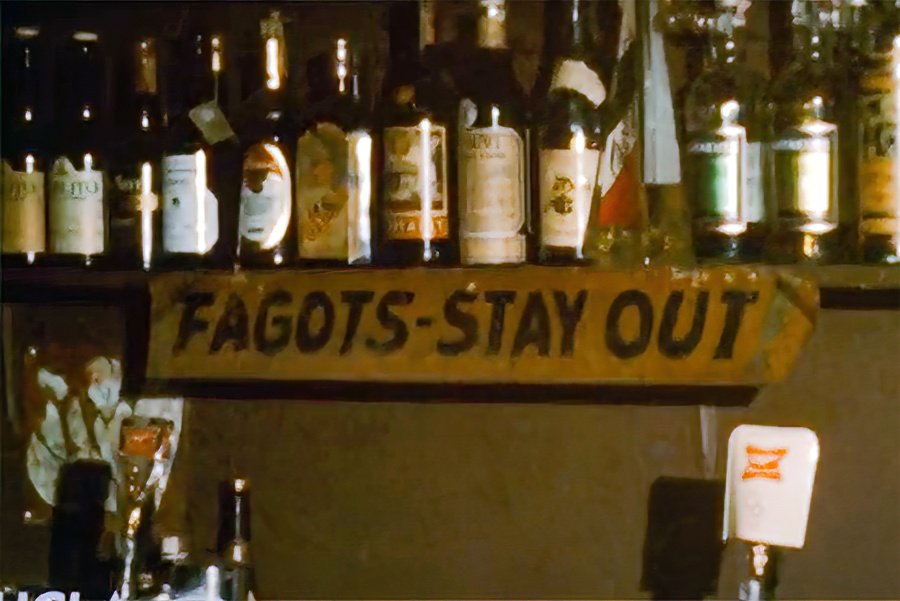

By Paulo Murillo | WEST HOLLYWOOD – The Academy Awards Museum recently featured three short films by trailblazing Los Angeles-based filmmaker and gay rights advocate Pat Rocco (1934–2018) last week, courtesy of Outfest UCLA Legacy Project at the UCLA Film & Television Archive.
Films featured were “Sign of Protest” (1970), “Meat Market Arrest” (1970), and “We Were There” (1976).
The short film “Sign of Protest” documents a February 7, 1970, gay liberation march outside Barney’s Beanery in West Hollywood, protesting a famous sign that read “Fagots [sic]–stay out” which hung proudly over the bar.
Rocco plays the role of neutral reporter on the scene in this activist interpretation of a newsfilm, interviewing the bar’s owners and patrons, as well as the protestors, and allowing their comments to speak for themselves.
Rocco is shown speaking with the daughter of the bar’s owner, who states nonchalantly that the sign has been up since 1959 and was originally accompanied by many more (since removed). She further states that the sign is part of the restaurant’s history and will not come down unless Barney’s is legally mandated to remove it.
Rocco then goes over to the sign posted above the bar and interviews customers about their opinion of it, which is largely positive.
Next, Rocco joins the 50 protesters outside and interviews Morris Kight, founder of the California chapter of the Gay Liberation Front, the organization that spearheaded the picket and a young Rev. Troy Perry, founder of the gay-affirming Metropolitan Community Church, who reiterates many of the comments heard from other protesters that the sign is offensive and should be taken down as a civil rights violation.
He also mentions a June 26, 1964, LIFE Magazine article about Barney’s Beanery and the controversial sign where the owner says homosexuals should be shot.
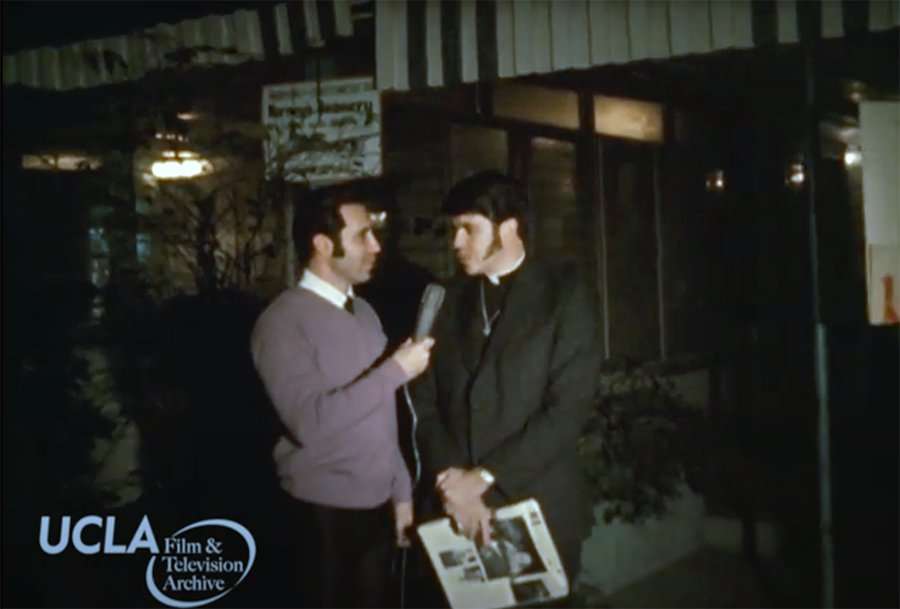
For those who missed on the big screen or wish to revisit it, the short film is available on YouTube, however, view at your discretion due to language some may find offensive.
Trailblazing Los Angeles-based filmmaker and gay rights advocate Pat Rocco (1934–2018) began his moviemaking efforts as a creator of queer male erotica in the late 1960s. When the public’s appetite shifted to hardcore, Rocco pivoted to documenting moments of LGBTQ protest and collective joy in his adopted city, often appearing on camera as an always gracious (and meticulously coiffed) interviewer of his many subjects.
Whether out in the streets capturing a demonstration of Barney’s Beanery in West Hollywood against their defamatory anti-gay signage (Signs of Protest), on the scene of an escalating situation with law enforcement at a gay bar (Meat Market Arrest), or capturing LA’s energetic early Pride parades (We Were There), Rocco’s films always culminate in moments of hope and a spirit of liberation that feel akin to Varda’s own joyful yet always inquisitive Weltanschauung.
**************************************************************************************
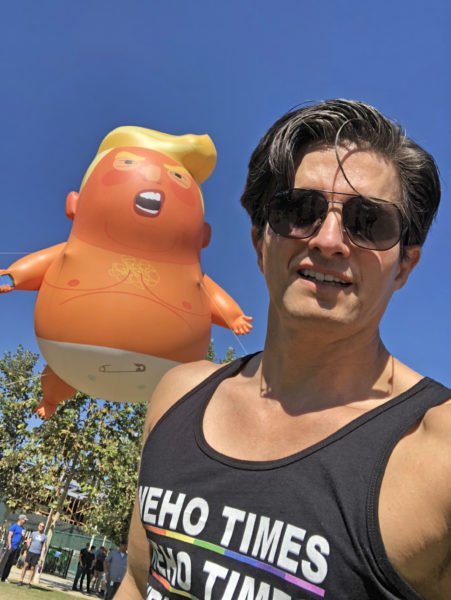
Paulo Murillo is Editor in Chief and Publisher of WEHO TIMES. He brings over 20 years of experience as a columnist, reporter, and photo journalist.
******************************
The preceding article was previously published by WeHo Times and is republished with permission.
History
Marking slavery’s end, a historic event now marks a Federal holiday
“The people of Texas are informed that, in accordance with a proclamation from the Executive of the United States, all slaves are free”
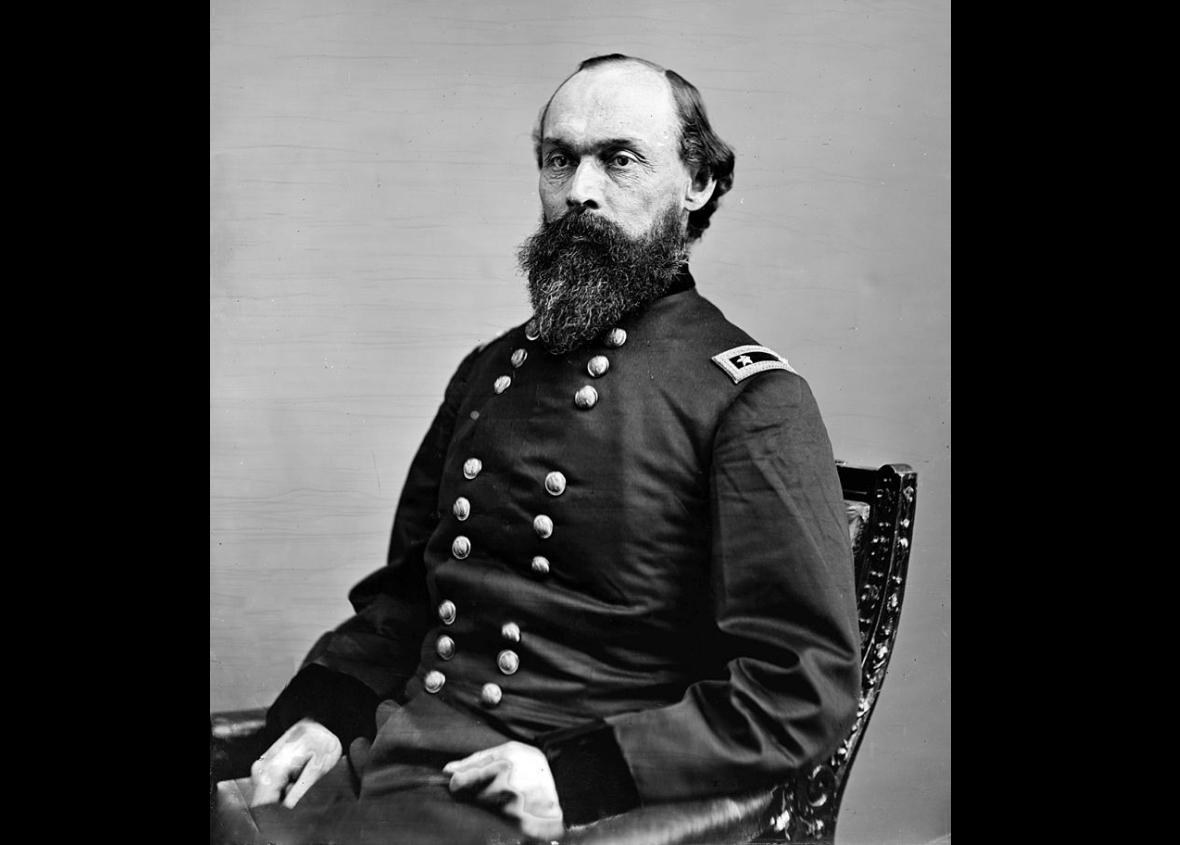
GALVESTON, Tx. – In the early summer of 1865, on a clear crisp June morning, the lead elements of the Federal Army of blue-coated soldiers of the 13th Army Corps occupied the island city of Galveston, Texas on Monday the 19th.
Led by Union Army Major General Gordon Granger, who had recently taken command of the Department of Texas, the 13th Corps was tasked with enforcement of the emancipation of slaves in the former Confederate state.
The bloody civil war had ended officially with the surrender of the Army of Northern Virginia commanded by Robert E. Lee to Commander of Union forces, Lieutenant General Ulysses S. Grant, at Appomattox Courthouse, Virginia on April 9, 1865.
The warfare between the last elements of the Confederate and Union troops however, dragged on for another month or so culminating in the Battle of Palmito Ranch, which was fought on May 12 and 13, 1865. The fighting occurred on the banks of the Rio Grande east of Brownsville, Texas on the Texas-Mexico border some 400 miles Southwest of Galveston.
It took approximately another two weeks for Confederate Lieutenant General Simon B. Buckner to surrender his command of the Trans-Mississippi Department (which included Texas) to Union Major General Peter J. Osterhaus on May 26, 1865.
General Granger was then tasked with implementing the order to free enslaved African Americans.
Once Granger’s Federals had taken control of the port city, he and his command staff headed to Union Army Headquarters located at the Osterman Building, once located Strand Street and 22nd Street.
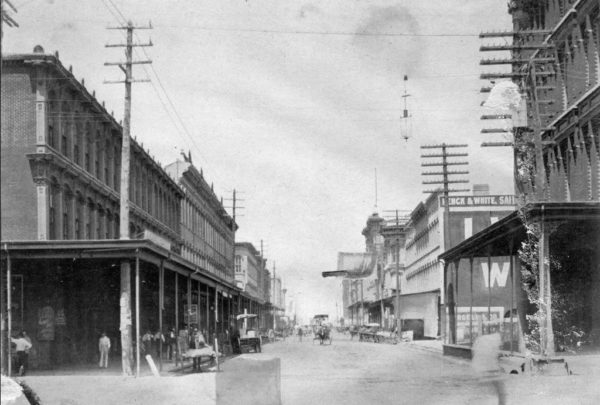
It was there that General Order No. 3 was first publicly read out loud to a gathering of now newly freed Black Americans and other citizens of the city.
“The people of Texas are informed that, in accordance with a proclamation from the Executive of the United States, all slaves are free. This involves an absolute equality of personal rights and rights of property between former masters and slaves, and the connection heretofore existing between them becomes that between employer and hired labor. The freedmen are advised to remain quietly at their present homes and work for wages. They are informed that they will not be allowed to collect at military posts and that they will not be supported in idleness either there or elsewhere.”
Sadly it would take nearly two years before all of the enslaved African Americans would actually be freed in Texas by white plantation owners and others who simply didn’t tell them or defied Federal authorities.
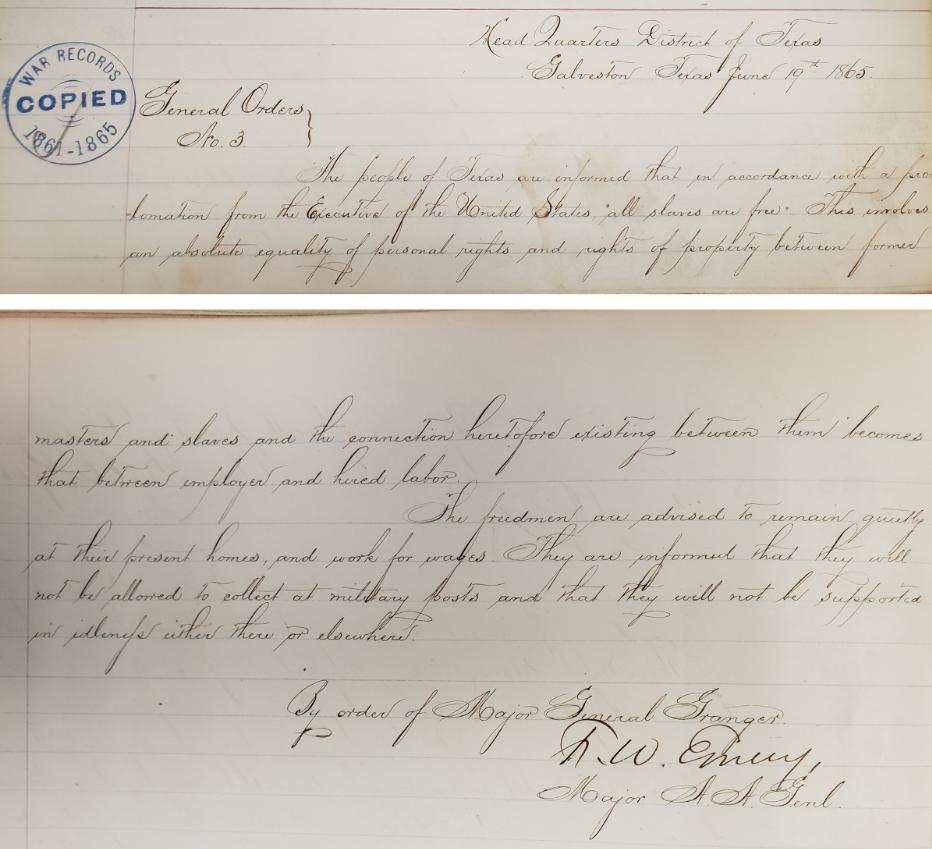
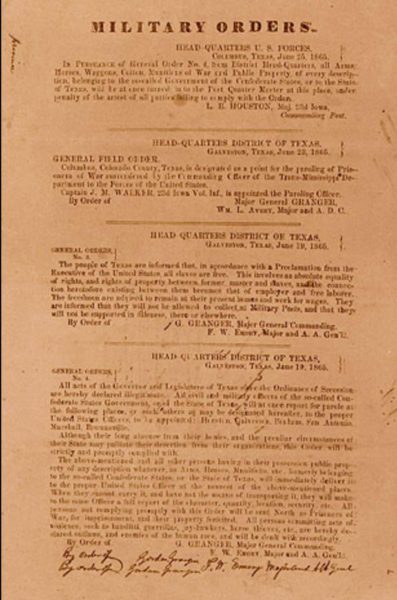
In 2014, the Texas Historical Commission placed a subject marker at the corner of 22nd and Strand, near the location of the Osterman Building, where General Granger and his men first read General Orders, No. 3.
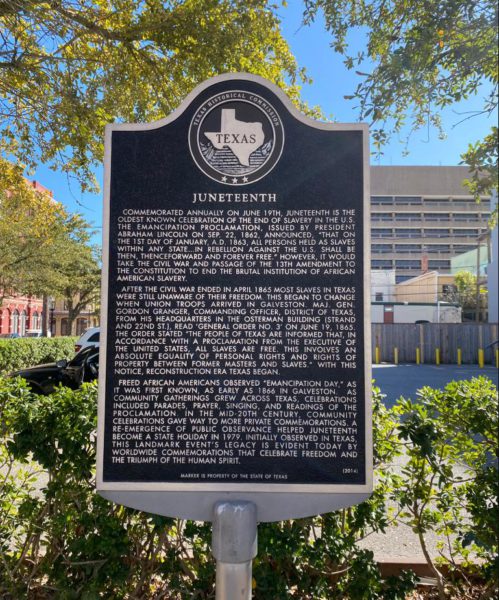
While many Black Americans across the former Confederate States would celebrate their freedom granted by The Emancipation Proclamation, issued by President Abraham Lincoln on Sep. 22, 1862 during the height of the war, in annual celebrations still others yet would annually mark the date of passage of the 13th Amendment to the U.S. Constitution by Congress on January 31, 1865, which abolished slavery in the United States.
Yet on Galveston Island, the tradition of marking their first learning of The Emancipation Proclamation, issued by President Lincoln with General Granger’s General Orders, No. 3, was the benchmark for ongoing annual celebrations and as the years went by as the Black Americans from the Lone Star state migrated ever Northward, it would be that seminal moment that ultimately would lead to the creation of a federal holiday and recognition some 156 years later.
One observer also wryly pointed out that the June anniversary was seasonally tied to better weather than the other two dates and more conducive to celebrations and large gatherings, hence its popularity in being established as the federal holiday.
Information and photographs provided by the National Archives, the City Of Galveston, Galveston Historical Foundation, the Library of Congress, and State of Texas, Texas Historical Commission.
History
50 years ago Atlanta’s nascent gay rights movement marched
“It was mostly about feeling good,” said Phil Lambert. “That we’re not a bunch of sick people. That we’re not the problem.”
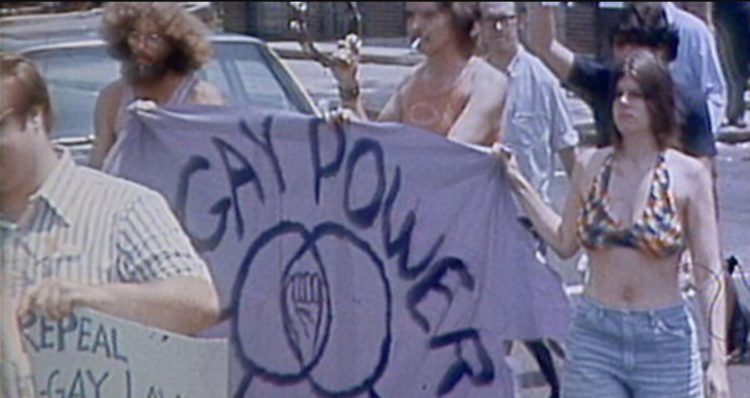
ATLANTA, Ga. – This Sunday, exactly fifty years ago to the day on a bright Sunday morning, about a hundred brave gay and lesbian Atlantans from the Georgia Gay Liberation Front, unfurled a lavender colored banner made from a bedsheet with the intertwined symbols representing male + male, female + female with the a raised fist of defiance and the words ‘Gay Power’ emblazoned on it and they marched.
The group inched its way up Peachtree Street to a soundtrack of chants, kazoos and a tambourine.
Mindful that stepping off the sidewalks could get them arrested — the city of Atlanta had turned down their request for a permit and the police were closely watching for jay-walkers — the marchers stopped at every corner until they were given the crossing signal, the Atlanta Journal-Constitution reported.
Prior to the coronavirus pandemic, the average estimated crowds in attendance at Atlanta Pride is upwards of 300,000 plus. But at the time the Journal-Constitution noted, even in the city that had just birthed the civil rights movement and was home to Dr. Martin Luther King Jr., LGBTQ rights was considered a radical issue that the Georgian liberal political establishment, including many Atlanta progressives, wanted to stay away from. At that time, gay sex was still illegal under state law, and the American Psychiatric Association characterized homosexuality as a mental illness.
For those GAGLF Atlantans who participated in that first pride march on June 27, 1971, the event was a turning point, a moment when, for the first time, they could publicly celebrate a part of themselves that society had long demanded they keep hidden.
“It was mostly about feeling good,” said Phil Lambert, a Vietnam veteran who was in attendance. “That we’re not a bunch of sick people. That we’re not the problem.”
Read the entire fascinating story: 50 years ago, Atlanta’s gay rights push took to street for first time
History
LGBTQ rainbow flag was born in San Francisco, but its history is disputed
On that day in June 1978, it felt as if the rainbow had always been a symbol for the LGBTQ community, it just hadn’t revealed itself yet

By August Bernadicou (with additional text and research by Chris Coats) | NEW YORK – Many enduring symbols that establish an instant understanding and define a diverse community are intrinsically linked with controversy, confusion, and ill-informed backstories dictated by vested interests and those who told the story loudest. The LGBTQ rainbow flag is no different.
While it was the work of many, the people who deserve credit the most have been minimized if not erased. Gilbert Baker, the self-titled “Creator,” screamed the story and now has a powerful estate behind his legacy. Before his death in 2017, Baker established himself as the complete authority on the LGBTQ rainbow flag. It was his story which he lived and became.
While there are disputed accounts on the flag’s origins, one thing that is not disputed is that the LGBTQ rainbow flag was born in San Francisco and made for the Gay Freedom Day Parade on June 25, 1978.
For all of human history, rainbows have mystified and inspired. A greeting of light and serenity after the darkness and chaos of a storm. They have symbolized hope, peace, and the mysteries of existence. For a moment, we can see the invisible structure, the “body” of light, made visible. A secret revealed, then hidden again.
Though it may seem like a modern phenomenon, rainbow flags have waved throughout history. Their origin can be traced to at least the 15th Century. The German theologian, Thomas Müntzer, used a rainbow flag for his reformist preachings. In the 18th Century, the English-American revolutionary and author, Thomas Paine, advocated adopting the rainbow flag as a universal symbol for identifying neutral ships at sea.
Rainbow flags were flown by Buddhists in Sri Lanka in the late 19th Century as a unifying emblem of their faith. They also represent the Peruvian city of Cusco, are flown by Indians on January 31st to commemorate the passing of the spiritual leader Meher Baba, and since 1961, have represented members of international peace movements.
Now, the rainbow flag has become the symbol for the LGBTQ community, a community of different colors, backgrounds, and orientations united together, bringing light and joy to the world. A forever symbol of where they started, where they have come, and where they need to go. When many LGBTQ people see a rainbow flag flowing in the wind, they know they are safe and free.
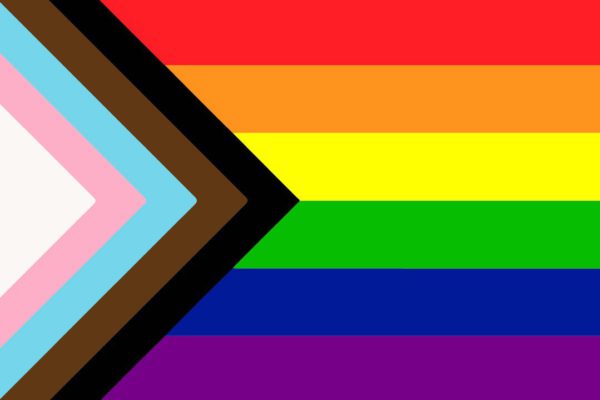
While the upper class and tech interests rule the city now, in the 1960s and 70s, San Francisco was a wonderland for low and no-income artists. The counterculture’s mecca. By the mid-1970s, the Haight-Ashbury neighborhood that had once been a psychedelic playground of hippie art, culture, and music had fallen into disarray. Hard, dangerous drugs like heroin had replaced mind-expanding psychedelics. Young queers and artists needed a new home, and they found it in the Castro.
Lee Mentley (1948-2020) arrived in San Francisco in 1972 and quickly fell in with the oddball artist and performers in the Castro neighborhood, donning flamboyant, gender-fucked clothes, performing avant-garde theater, and creating their own clubhouses. He was on the Pride Planning Committee in 1978 and ran the Top Floor Gallery on the top floor of 330 Grove, which served as an early Gay Center in San Francisco.
Lynn Segerblom (Faerie Argyle Rainbow) was originally from the North Shore of Hawaii and moved to San Francisco where she attended art school at the Academy of Art. Her life changed when she found a new passion in tie-dye and rainbows in the early 1970s. Entrenched in the free-loving technicolor world of San Francisco, in 1976, Lynn legally changed her name to Faerie Argyle Rainbow. She joined the Angels of Light, a “free” performance art troupe where the members had to return to an alternative, hippie lifestyle and deny credit for their work.
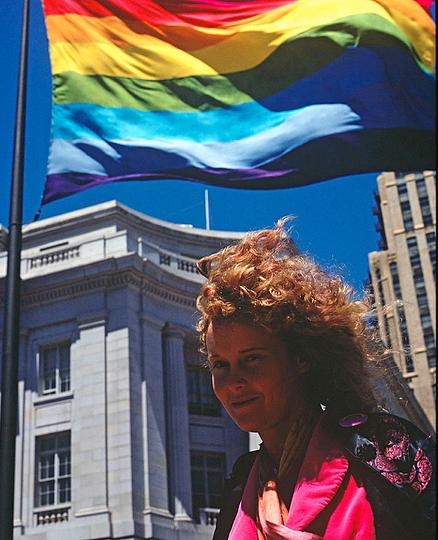
Shortly after the original rainbow flags were flown for the last time, both Lynn and Lee moved out of San Francisco. Lee moved to Hawaii and Lynn moved to Japan. When they returned, they were shocked to see how their contribution to history was becoming a universal symbol. They remain passionate about defending their legacies and giving a voice to the mute.
——–
LEE MENTLEY: “One day in 1978, Lynn came to 330 Grove with a couple of her friends, James McNamara and Robert Guttman, and said we should make rainbow flags for Gay Day to brighten up San Francisco City Hall and Civic Center because it’s all gray and cold in June. We thought that it sounded like a great idea.”
To get over the first hurdle, money, the young artists went to Harvey Milk, the first openly gay elected official in the history of San Francisco, California, for help.
LEE: “There was no actual funding for it. We contacted Harvey Milk and another supervisor, and they asked the city if we could get a little funding. They found some leftover funds from the previous year’s hotel tax, and we got $1,000.”
LYNN SEGERBLOM: “I remember having a meeting where I presented the idea of making rainbow flags. I had some sketches. At that meeting, there was just a handful of us there, and I remember, and even my friend assured me, that Gilbert Baker was not at that meeting. I don’t know where he was, I didn’t keep track of him, but he was not at the meeting where I suggested rainbow flags. We decided, yes, rainbow flags sounded great.”
The committee approved the rainbow imagery and made the decision to make two massive 40’ x 60’ foot rainbow flags to be flown at the Civic Center along with 18 smaller rainbow flags designed by different, local artists, to line the reflecting pool putting rainbows into the grey sky.
For the two large flags, one would be an eight-color rainbow starting with pink and including turquoise and indigo in place of blue, and the other a re-envisioning of the American flag with rainbow stripes which became known as Faerie’s flag.
——
Gilbert Baker’s name on his memoir, Rainbow Warrior, it says “CREATOR OF THE RAINBOW FLAG,” leaving little debate that Gilbert claimed full ownership for the concept and design of the legendary symbol. He never denied Lynn or James MacNamara’s involvement in the flags’ construction and speaks briefly and fondly of them and their talents in that same book.
LEE: “We didn’t need one person saving our ass, and it certainly wouldn’t have been Gilbert Baker. He was no Betsy Ross. He was a very good promoter, and I give him all the credit in the world for making the rainbow flag go international. He did a great service, and he was a very talented, creative man, but he could never have done all of the work by himself; no one could have.
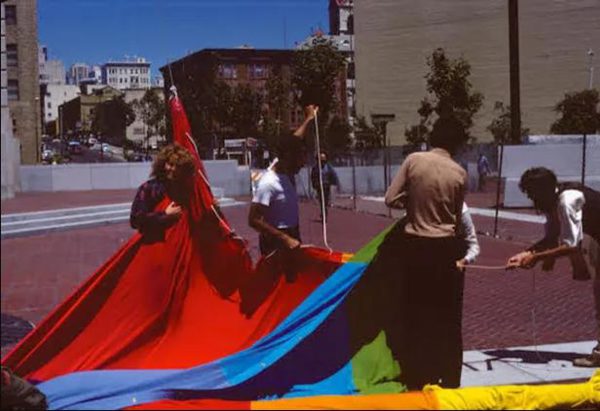
We never considered ownership. There was never this big ownership debate until Gilbert started it. Because AIDS hit us so fast after this, most of our leadership either went into HIV activism or died.”
LYNN: “The story is that a white gay man did all of this by himself, but, in fact, that is not true at all. He just promoted it. For that, though, he should be given great love.”
————
Making the two original rainbow flags was no easy feat. With a limited budget and limited resources, the group had to improvise and figure it out as they went along. While Lynn had dabbled in flags before, a project of this scope and importance was far beyond her comfort zone.
LEE: “The community donated the sewing machines we used. We asked people at the Center if anyone would like to volunteer. All sorts of people from all over the country helped us with the flags, over 100 people, which, to me, is an amazing story. That’s where it came from. It came from regular artists who wanted to have fun and make something pretty for gay people.”
LYNN: “The Rainbows Flags were hand-dyed cotton and eight colors. I made two different types. The one with just the stripes and then the American flag one, which I designed myself. There was a group of us that made them, James McNamara, Gilbert Baker, and myself. Originally they were my designs. I was a dyer by trade, and I had a dying studio at the Gay Community Center at 330 Grove Street.”
LEE: “People would come and help as long as they could. Then, somebody else would come and help as long as they could. We opened up the second floor of 330 Grove to people who came to be in the Parade and march. People came in and made posters, banners and did art stuff.”
LYNN: “We made the flags on the roof because there was a drain up there. There was a wooden ladder that led up to the roof. The hot water had to be carried up to the roof because we didn’t have hot water up there. We heated it up on the stove in pots. We put the hot water in trash cans on the roof.”
LEE: “We had trash cans and two by fours, and we had to keep agitating the fabrics in the dye. Since they were in hot water, they had to be poked and agitated for hours.”
LYNN: “We had to constantly move the fabric in the dye, so the dye penetrated the fibers that weren’t clamped tight. We had to make sure there would be blue, and it wouldn’t just be white on white or white with a very murky, pale blue.
After they were washed and dyed, they went through the washer and dryer. Then, we ironed them. If the fabric stays out too long, once you take it out of the water, if it sits on itself even for just a few minutes, it starts to make shapes.”
—-
LEE: “Lynn’s flag, the new American flag, was a similar rainbow, but it had stars in the corner. I have photographs of that flag flying at gay events in San Francisco at City Hall and Oakland.”
LYNN: “I always liked the American flag. I thought, oh, wouldn’t that be nice? I knew with some luck I could make it.”

LEE: “I thought the one with the stars was more interesting because it symbolized a new flag for the United States.”
LYNN: “For my American flag, I decided to flip the order of the colors, so pink was at the bottom and purple was at the top in an eight-color spectrum. That was intentional. I wanted them to be different.
I made the stars with wood blocks and clamps. I got the white fabric and washed it, and folded it a different way. When I was making it, it looked like a big sandwich. The bread would be the woodblocks, and the fabric was in between. We immersed the whole flag in dye and swished it around. I wasn’t sure if it would come out right because it was the first time I did that fold. I was lucky. It worked.
I sewed lamé stars into one stripe with leftover stars from my Angels of Light costumes. On one side of the blue stripe, there was a star with silver lamé, and on the other side, there was a star with gold lamé.
I got all these ideas because I worked with these mediums on a daily basis: paint, dye, fabric, and glitter.”
—
LEE: “We worked for weeks dying fabric, shrinking fabric, and sewing fabric.”
LYNN: “We worked on them for seven weeks. I was worried that we weren’t going to finish on time. We worked hard and long hours. Towards the end, we decided we didn’t have time to go to the laundromat, so we started rinsing them on the roof and wringing them dry. We also ran out of quarters. We draped them off of the Top Floor Gallery’s rafters, and they drip-dried. They looked great. They were beautiful.”
Until that day, the pink triangle, used by the Nazis to label homosexuals in their genocidal campaign, was the most commonly used symbol for the LGBTQ movement, a symbol in solidarity with our fallen ancestors. But the triangle came from a place of trauma, it was a reminder of the storm while the rainbow was the hope that came after. The promise of brighter days ahead.
On that day in June 1978, it felt as if the rainbow had always been a symbol for the LGBTQ community, it just hadn’t revealed itself yet.
LEE: “We went out, flew the flags, and blew everybody’s fucking minds. People were blown away. The flags were so beautiful. They were waving warriors. The biggest ones were 40’ by 60’ feet. The Parade marched through the flags to get to Civic Center. We instantly proclaimed that this was our symbol. It wasn’t planned. It was organic.”
LYNN: “It was just what I wanted: a touch of magic, a touch of glitter, and a little bit of Angels of Light.”
LEE: “We weren’t creating this huge symbol. We were decorating Civic Center. We weren’t thinking of marketing our entire futures. It was an art project.”
LYNN: “We looked at the rainbow flags as a work of art, and we wanted them to be beautiful and unique. After the Gay Parade, the flags were a big hit. People loved them. Everybody loved them.”
—-
In the pre-technology world, people and property could just disappear. There were no surveillance cameras. Lynn didn’t even have a phone.
Even though no one could have known the flag would become an eternal symbol for a worldwide community, it was clear even then that they were a piece of history to be coveted.
In his memoir, Baker hypothesizes that the Rainbow American flag was stolen shortly after it was hung up on the front of the Gay Community Center for Gay Freedom Day in 1979. He suggests it might have been a construction crew working on the new symphony across the street and in a homophobic act, stole the flag and buried it in cement.
LEE: “Later in 1979 or 1980, you can find it somewhere in the minutes for a Pride Foundation meeting, Gilbert came to us and asked to borrow the two large flags, and we agreed. We never saw them again.”
LYNN: “I went to work one day at 330 Grove, and Gilbert came in and said that the two 40’ by 60’ flags had been stolen.”
Images published in the San Francisco Chronicle, videos of the march, and other widely distributed photographs only add to the mystery. They show both the classic rainbow flag of eight stripes and the American revision flying at the Civic Center on June 24, 1979 and not at the Gay Community Center.
As for the original eight-stripe flag, there are even fewer answers. In his memoir, Baker says that while they were taking down the flags from Civic Center, he was hit on the head on knocked out. “When I came to on the muddy ground,” he says “I saw people all around me hitting each other and screaming obscenities. They were fighting over the rainbow flags, pulling on them like a game of tug-of-war, tearing them.”
LYNN: “It would have taken more than one person to carry the flags. It took three people to carry one folded-up flag for the Parade, and we needed a van. They weighed a lot, and 330 Grove did not have an elevator. Whoever stole them had help—one person could not do it on their own.”
—-
LYNN: “Before the rainbow flag missing, Gilbert came to one of my workshops. He wanted to watch me dying fabric all day and see how I did everything.
I was like, oh yeah, I’ll show you, come in.
I said, here, put some gloves on and do it with me.
He was like, oh, no, no, I don’t want to get my hands dirty.
He was only trying to figure out how I did the dying.”
—-
LEE: “Gilbert went to these places like MoMa and told them these outrageous stories about how he made the rainbow flag all by himself. He said this about the flag he donated. When you look at it, you can tell that it was bought at a craft fair. It flat out wasn’t one of our flags. It was polyester.”
LYNN: “It was polyester, it wasn’t the same size, and it wasn’t hand-dyed. My flags were different. The rainbow flag at MoMa was a beautiful flag inside a frame, but it wasn’t an original, not from 1978, not even a piece from 1978. I was hoping, oh, my God, maybe this is a piece of it.”
LEE: “It wasn’t even the original colors. MoMa said they were original flags, but they weren’t. It was a commercially produced rainbow flag with a primary color rainbow. The plaque cited Gilbert donating it as an original flag.”
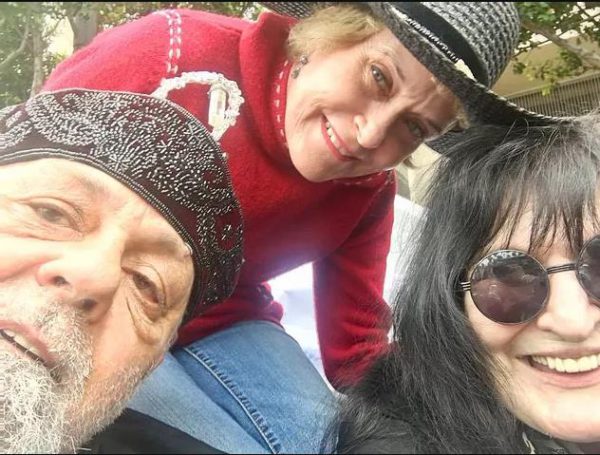
—-
LYNN: “I read online that Gilbert Baker said he named me “Faerie Argyle Rainbow,” a complete lie. Bethany the Princess of Argyle named me. I chose the name Rainbow because I was known as a rainbow artist.”
LEE: “Even Lynn’s driver’s license said her name was “Faerie Argyle Rainbow.””
LYNN: “In 1976, I filled out a form at the DMV, and my name became Faerie Argyle Rainbow. Back then, they didn’t ask you for a birth certificate. The employee just said, “This is your name now,” and gave me a driver’s license that said Faerie Argyle Rainbow.
It all sounds crazy now, but back then, it wasn’t.”
—–
LEE: “I had my arguments and fights with Gilbert Baker because he claims he came up with the rainbow flag. If you go through all of his different interviews, you see that his story changes over and over and over again. He even said Harvey Milk came to him and asked him to create a symbol for the movement. No—I read that, and no such thing happened.”
LYNN: “Just look at his interviews. His takes on what the colors in the rainbow flag mean are all in his head. The rainbow represents everyone, no matter what gender or race you are; that’s how I looked at it. Rainbows are in nature and beautiful. People love them, and I love them. I knew they would be great color healing.
Gilbert assigning meaning to each color is ridiculous. I think anyone could make up what each color means. If I wanted to, I could do the same. It wasn’t what I was thinking. I was thinking that rainbows encompass everybody, the whole group, unity.”
LEE: “I have tried to convince people that the rainbow flags were made with tax-payer dollars. We made them as a non-profit.
Not even Gilbert owns them. I have always thought that anyone who sells anything rainbow should give a portion of the profits to homeless gay youth. We need to take care of our own kind because no one does. The whole concept of taking care of gay people has disappeared.”
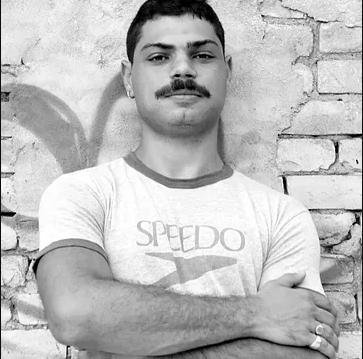
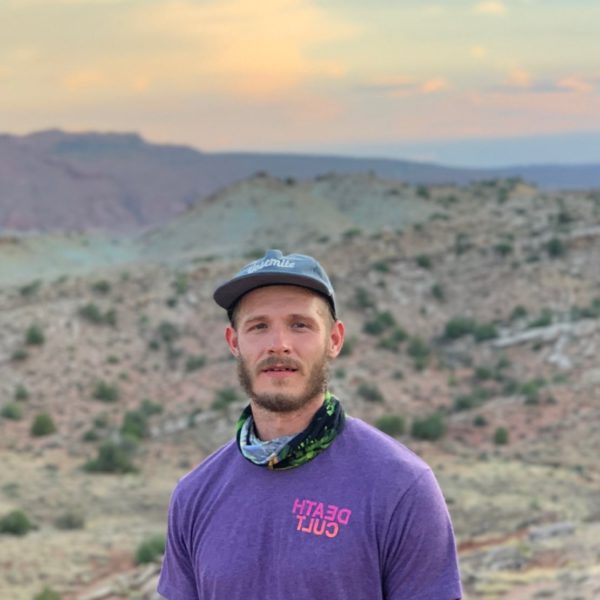
August Bernadicou is a 27-year-old gay historian and the President of the LGBTQ History Project Inc. Chris Coats is an editor and producer.
Together, they produce the QueerCore Podcast and will shortly be releasing an episode that is the definitive story on the rainbow flag featuring Lee Mentley, Lynn Segerblom, and Adrian Brooks.
August Bernadicou is presenting a Pride event in NYC this year that all folks are cordially invited to attend- its virtual;
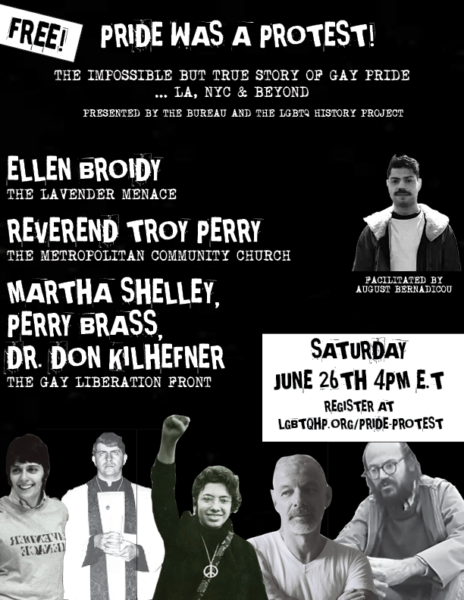
Here is the link for the event: https://www.lgbtqhp.org/pride-protest
-
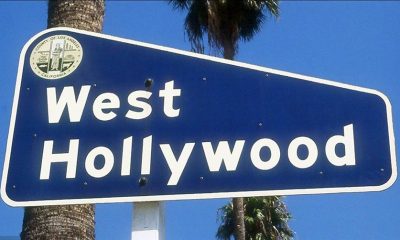
 News2 days ago
News2 days agoWest Hollywood to advance protections for diverse and non-nuclear families
-

 Commentary4 days ago
Commentary4 days agoThe Supreme Court’s ‘Don’t Read Gay’ ruling
-

 Arts & Entertainment3 days ago
Arts & Entertainment3 days ago2025 Emmy nominations: ‘Hacks’ and ‘The Last of Us’ bring queer excellence to the table
-

 a&e features4 days ago
a&e features4 days agoThe art of controlled chaos: Patrick Bristow brings the Puppets to life
-

 Movies3 days ago
Movies3 days ago‘Superman’ is here to to save us, despite MAGA backlash
-

 Sports3 days ago
Sports3 days agoHololive and Dodgers create a home for queer fandom
-

 Events2 days ago
Events2 days agoLos Angeles Blade to take special part in NLGJA Los Angeles inaugural journalism awards
-

 Features7 hours ago
Features7 hours agoTS Madison Starter House offers a blueprint for Black, trans liberation



